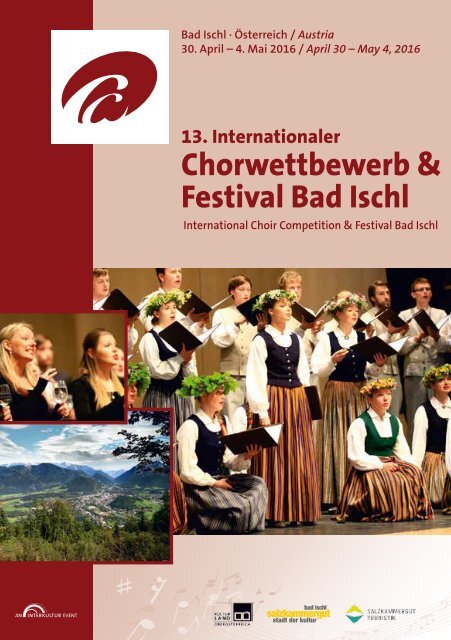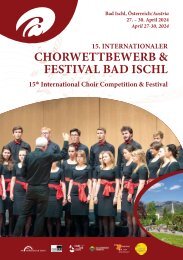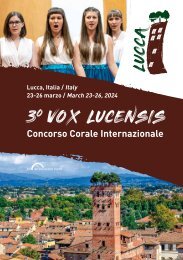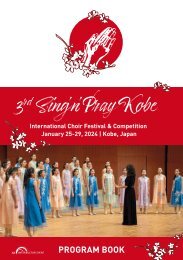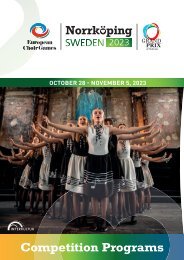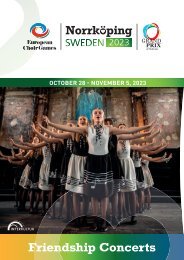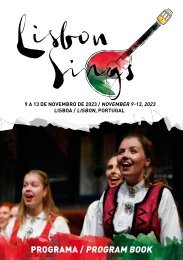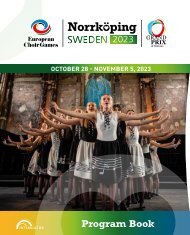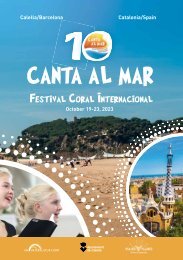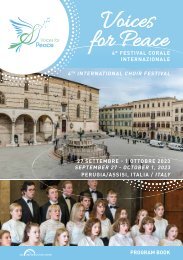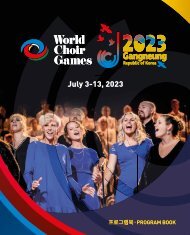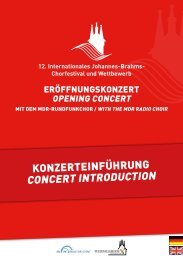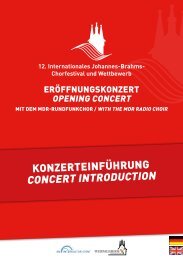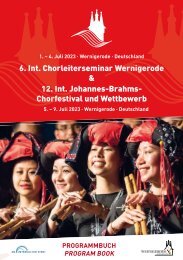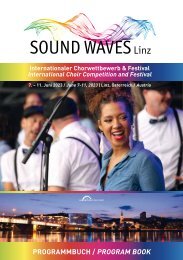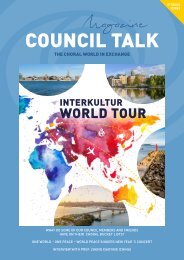Bad Ischl 2016 - Program Book
April 30 - May 04, 2016 Bad Ischl, Austria Singing in the midst of mountains and lakes Already for the 13th time the International Choir Competition & Festival will take place in Bad Ischl. This international choir competition, located in the midst of the picturesque landscape of the Salzkammergut, has become one of the most important and most beautiful choral events in Austria by now. International and renowned jurors and choral experts will evaluate the vocal performances and help the choirs with words and deeds during the Evaluation Performances. Apart from the competitions in the Kongresshaus, Gala Concerts, international Friendship Concerts and performances during masses will take place during the event. But the colorful highlight will be the international choir parade throughout the center of this Austrian spa. Intercultural meetings between choirs and choral music lovers will make this event a memorable experience.
April 30 - May 04, 2016 Bad Ischl, Austria
Singing in the midst of mountains and lakes
Already for the 13th time the International Choir Competition & Festival will take place in Bad Ischl. This international choir competition, located in the midst of the picturesque landscape of the Salzkammergut, has become one of the most important and most beautiful choral events in Austria by now. International and renowned jurors and choral experts will evaluate the vocal performances and help the choirs with words and deeds during the Evaluation Performances.
Apart from the competitions in the Kongresshaus, Gala Concerts, international Friendship Concerts and performances during masses will take place during the event. But the colorful highlight will be the international choir parade throughout the center of this Austrian spa. Intercultural meetings between choirs and choral music lovers will make this event a memorable experience.
You also want an ePaper? Increase the reach of your titles
YUMPU automatically turns print PDFs into web optimized ePapers that Google loves.
<strong>Bad</strong> <strong>Ischl</strong> · Österreich / Austria<br />
30. April – 4. Mai <strong>2016</strong> / April 30 – May 4, <strong>2016</strong><br />
13. Internationaler<br />
Chorwettbewerb &<br />
Festival <strong>Bad</strong> <strong>Ischl</strong><br />
International Choir Competition & Festival <strong>Bad</strong> <strong>Ischl</strong>
2
3<br />
13. Internationaler Chorwettbewerb<br />
& Festival <strong>Bad</strong> <strong>Ischl</strong><br />
13 th International Choir Competition & Festival <strong>Bad</strong> <strong>Ischl</strong><br />
30. April – 4. Mai <strong>2016</strong>, <strong>Bad</strong> <strong>Ischl</strong>, Österreich<br />
April 30 – May 4, <strong>2016</strong>, <strong>Bad</strong> <strong>Ischl</strong>, Austria<br />
Veranstalter / Organizer<br />
Förderverein INTERKULTUR Österreich e.V.<br />
in Kooperation mit / in cooperation with<br />
Stadt <strong>Bad</strong> <strong>Ischl</strong><br />
Land Oberösterreich, Kulturdirektion<br />
Salzkammergut Touristik GmbH<br />
Tourismusverband <strong>Bad</strong> <strong>Ischl</strong><br />
Ehrenschutz / Patronage<br />
Dr. Josef Pühringer, Landeshauptmann<br />
Hannes Heide, Bürgermeister<br />
Präsident Interkultur / President Interkultur<br />
Günter Titsch (Deutschland / Germany)<br />
Künstlerisches Komitee / Artistic Committee<br />
Prof. Dr. Ralf Eisenbeiß (Deutschland / Germany), Leitender Künstlerischer Direktor<br />
Assoc. Prof. Romāns Vanags (Lettland / Latvia)<br />
Christian Ljunggren (Schweden / Sweden)<br />
Johan Rooze (Niederlande / Netherlands)<br />
Fred Sjöberg (Schweden / Sweden)<br />
INTERKULTUR Präsidium / INTERKULTUR Executive Committee<br />
Günter Titsch (Deutschland / Germany)<br />
Qin Wang (China)<br />
Stefan Bohländer (Deutschland / Germany)<br />
Dr. Christoph Wirtz (Deutschland / Germany), Generalsekretär
4<br />
Sponsoren und Förderer / Sponsors and Support<br />
DANK DEN SPONSOREN<br />
Als Veranstalter des 13. Internationalen<br />
Chorwettbewerbs & Festival <strong>Bad</strong> <strong>Ischl</strong> ist<br />
es dem Förderverein INTERKULTUR Österreich<br />
ein Herzensbedürfnis, den Sponsoren<br />
unseres erfolgreichen Festivals im Namen<br />
aller ca. 1000 Mitwirkenden für ihre großzügige<br />
Unterstützung zu danken. Ohne die<br />
folgenden Firmen und Institutionen wäre<br />
die Durchführung dieses herrlichen Treffens<br />
von 24 exzellenten Chören aus 14 Ländern<br />
nicht möglich gewesen.<br />
Unser besonderer und herzlichster Dank gilt:<br />
dem Land Oberösterreich - Kulturdirektion,<br />
der Stadt <strong>Bad</strong> <strong>Ischl</strong> und dem Tourismusverband<br />
<strong>Bad</strong> <strong>Ischl</strong> für die freundliche Unterstützung.<br />
Weiterhin danken wir der Salzkammergut<br />
Touristik GmbH und insbesondere der<br />
Geschäftsführerin Brigitte Stumpner für die<br />
gute Zusammenarbeit.<br />
THANKS TO THE SPONSORS<br />
As organizer of the 13 th International Choir<br />
Competition & Festival <strong>Bad</strong> <strong>Ischl</strong>, it is a<br />
deep pleasure for INTERKULTUR Foundation<br />
Austria to thank the sponsors of our successful<br />
festival for their kind support in the name<br />
of about 1000 participants. Without the following<br />
companies and institutions, this outstanding<br />
event with 24 excellent choirs from<br />
14 different countries would not have been<br />
possible.<br />
We would especially like to thank:<br />
The Province of Upper Austria – Cultural<br />
directorate, The City of <strong>Bad</strong> <strong>Ischl</strong>, the Tourismusverband<br />
<strong>Bad</strong> <strong>Ischl</strong>. Furthermore we<br />
would like to thank the Salzkammergut<br />
Touristik GmbH and especially its executive<br />
director Brigitte Stumpner for their friendly<br />
support.
5<br />
Inhaltsverzeichnis / Table of contents<br />
Seite / Page<br />
Veranstalter / Organizer 3<br />
Inhaltsverzeichnis / Table of contents 5<br />
Teilnehmerländer / Participating countries 6<br />
Grußworte / Greetings 8<br />
• Günter Titsch, Präsident INTERKULTUR / President INTERKULTUR<br />
• Dr. Josef Pühringer, Landeshauptmann / Governor<br />
• Hannes Heide, Bürgermeister <strong>Bad</strong> <strong>Ischl</strong> / Mayor <strong>Bad</strong> <strong>Ischl</strong><br />
Förderverein INTERKULTUR / About INTERKULTUR 17<br />
• … Brücken der Begegnung / … Connecting Bridges<br />
Über <strong>Bad</strong> <strong>Ischl</strong> / About <strong>Bad</strong> <strong>Ischl</strong> 24<br />
Künstlerisches Komitee und Jury / Artistic Committee and Jury 30<br />
• Künstlerische Direktoren / Artistic Directors<br />
• Jury / Jury members<br />
Allgemeiner Ablauf / General Schedule 40<br />
• Galakonzerte / Gala Concerts<br />
Wettbewerb / Competition 50<br />
• Veranstaltungsorte / Venues<br />
Chöre / Choirs 64<br />
Vorherige Gewinner / Previous Winners 78<br />
Stadtplan / Downtown Map 80<br />
Impressum & Team / Imprint & Team 82
6<br />
Teilnehmerländer / Participating Countries<br />
China /<br />
Peoples Republic of<br />
China<br />
Lettland / Latvia<br />
Deutschland /<br />
Germany<br />
Österreich / Austria<br />
Estland / Estonia<br />
Schweden / Sweden<br />
Färöer / Faroe Islands<br />
Slowenien / Slovenia<br />
Finnland / Finland<br />
Südafrika /<br />
South Africa<br />
Italien / Italy<br />
Tschechische Republik /<br />
Czech Republic<br />
Japan<br />
Türkei / Turkey<br />
Kroatien / Croatia<br />
Weißrussland /<br />
Belarus
7
8
GRUSSWORTE<br />
GREETINGS<br />
9
10<br />
Günter Titsch<br />
Präsident INTERKULTUR /<br />
President INTERKULTUR<br />
Liebe Freunde der Chormusik,<br />
im Namen von INTERKULTUR heiße ich Sie<br />
zum 13. Internationalen Chorwettbewerb<br />
& Festival <strong>Bad</strong> <strong>Ischl</strong> sehr herzlich willkommen.<br />
In diesem Jahr freuen wir uns ganz<br />
besonders, dass wieder eine große Anzahl<br />
von internationalen Chören den Weg in die<br />
altehrwürdige Kaiserstadt gefunden hat,<br />
die nicht nur eine Perle im Salzkammergut<br />
darstellt, sondern mit ihrer bewegten<br />
Geschichte auch ein Brennpunkt für große<br />
weltpolitische Entwicklungen war. Wir sind<br />
sehr glücklich, dass sich in diesem Jahr 24<br />
Chöre aus 14 Nationen zu unserem Sängertreffen<br />
einfinden werden. Und gerade die<br />
Herkunftsländer unserer Chöre erfüllen uns<br />
mit Stolz, sind doch neben europäischen<br />
Chören beispielsweise Gruppen aus Japan,<br />
China, von den Färöer Inseln, aus Südafrika<br />
und der Türkei darunter.<br />
Unser INTERKULTUR Motto „Singing together<br />
brings nations together“ wird hier<br />
also wieder auf eindrucksvolle Weise unter<br />
Beweis gestellt. So vielfältig wie unsere<br />
Chöre ist auch unser Festivalprogramm,<br />
bietet es doch zahlreiche Wettbewerbskonzerte,<br />
Galaveranstaltungen und Begegnungen<br />
in <strong>Bad</strong> <strong>Ischl</strong> in seiner malerischen<br />
Umgebung.<br />
Ich möchte allen Unterstützern und Sponsoren<br />
meinen herzlichen Dank für die hervorragende<br />
Zusammenarbeit und Hilfe bei<br />
der Organisation des Festivals danken. Ganz<br />
besonderer Dank gilt der Landeskulturdirektion<br />
Oberösterreich, der Stadt <strong>Bad</strong> <strong>Ischl</strong>,<br />
dem Tourismusverband <strong>Bad</strong> <strong>Ischl</strong> und der<br />
Salzkammergut Touristik GmbH.<br />
Ich wünsche dem 13. Internationalen Chorwettbewerb<br />
& Festival <strong>Bad</strong> <strong>Ischl</strong> weiterhin<br />
großen Erfolg und uns allen wieder großartige<br />
Kunst- und Kulturerlebnisse mit viel<br />
internationalem Flair im schönen Salzkammergut.<br />
Günter Titsch<br />
Präsident INTERKULTUR
11<br />
Dear Friends of Choral Music,<br />
On behalf of INTERKULTUR, I would like to extend<br />
a warm welcome to you all to the 13 th International<br />
Choir Competition & Festival <strong>Bad</strong><br />
<strong>Ischl</strong>. This year, it is a particular pleasure for us<br />
to once again see the large number of international<br />
choirs that are joining us here in the<br />
venerable imperial city of <strong>Bad</strong> <strong>Ischl</strong>. This town<br />
is not only a true gem of the Salzkammergut.<br />
With its turbulent history, it also stands out<br />
as a focal point of world politics in the past<br />
and their far-reaching implications for today.<br />
We are very happy that as many as 24 choirs<br />
from 14 nations are gathering here this year<br />
for our renowned encounter of singers from<br />
around the globe. And it is this wide range of<br />
home countries of our choirs that fills us with<br />
particular pride. This is why we are very delighted<br />
to see, in addition to the choirs from<br />
continental Europe, the many other choral<br />
ensembles from countries like Japan, China,<br />
the Faroe Islands as well as from Turkey and<br />
even South Africa.<br />
So, in keeping with our INTERKULTUR motto<br />
”Singing together brings nations together“,<br />
this event is yet again going to bear impressive<br />
witness to our credo. The program of the<br />
festival is just as varied and multi-faceted as<br />
the choirs we have invited. We can look forward<br />
to the numerous concerts that form integral<br />
part of the competition itself as well as<br />
to the several Gala Concerts and encounters<br />
in the city of <strong>Bad</strong> <strong>Ischl</strong> with its in most picturesque<br />
surroundings and Alpine landscape.<br />
I would like to thank all supporters and sponsors<br />
for their outstanding cooperation and assistance<br />
with the organization of this festival.<br />
In particular, I would like to express my sincere<br />
gratitude to the Landeskulturdirektion Oberösterreich,<br />
the City of <strong>Bad</strong> <strong>Ischl</strong>, Tourismusverband<br />
<strong>Bad</strong> <strong>Ischl</strong> and Salzkammergut Touristik<br />
GmbH.<br />
I wish that the 13 th International Choir Competition<br />
and Festival <strong>Bad</strong> <strong>Ischl</strong> may continue<br />
its great story of success this year and that all<br />
of us may once again have a fantastic time<br />
and experience marvelous artistry and culture<br />
with international feel in the wonderful<br />
Salzkammergut region.<br />
Günter Titsch<br />
President INTERKULTUR
12<br />
Dr. Josef Pühringer<br />
Landeshauptmann /<br />
Governor of Upper Austria<br />
Kultureller Höhepunkt und gelebte Kultur<br />
Ein herzliches Willkommen an die 24 Chöre aus<br />
aller Welt, die sich bereits zum 13. Mal beim Internationalen<br />
Chorwettbewerb & Festival vom<br />
30. April bis 4. Mai <strong>2016</strong> in <strong>Bad</strong> <strong>Ischl</strong> versammeln.<br />
Als Landeskulturreferent ist es mir eine besondere<br />
Freude, dass der musikalische Wettstreit<br />
der Chorgäste aus Nah und Fern im Rahmen<br />
dieses Festivals und in einer der schönsten<br />
Gegenden unseres Bundeslandes stattfinden<br />
kann. In ganz <strong>Bad</strong> <strong>Ischl</strong> dreht sich in diesen<br />
Tagen alles um das Chorsingen – Gala- und<br />
Freundschaftskonzerte in der Stadt und der<br />
unmittelbaren Umgebung bringen das Festival<br />
in die Gesellschaft und zu den Menschen. Der<br />
Wettbewerb ist somit nicht nur ein Treffen einer<br />
eingeschworenen Chorszene, sondern ein<br />
kultureller Höhepunkt und zugleich gelebte<br />
Kultur!<br />
Ich freue mich auch die hochkarätige Jury von<br />
internationaler Provenienz begrüßen zu dürfen,<br />
die nicht nur die <strong>Program</strong>me der Chöre beurteilen<br />
wird, sondern auch die weitreichende Bedeutung<br />
dieses Chorfestes unterstreicht.<br />
Neben dem Wettbewerbsgedanken soll jedoch<br />
besonders das Verbindende im Chorsingen und<br />
die gesellschaftliche Komponente sowie der<br />
Austausch der unterschiedlichen Kulturen im<br />
Mittelpunkt stehen.<br />
Allen Verantwortlichen, die maßgeblich am Gelingen<br />
und an der Umsetzung dieses Festivals<br />
beteiligt sind – allen voran Interkultur und die<br />
Stadt <strong>Bad</strong> <strong>Ischl</strong> – danke ich herzlich und wünsche<br />
allen Chören nicht nur Freude beim Singen,<br />
sondern auch den verdienten Erfolg beim<br />
Wettbewerb.<br />
Dr. Josef Pühringer<br />
Landeshauptmann
13<br />
Cultural Highlight and Lived Culture<br />
A cordial welcome to the 24 choirs from all over<br />
the world gathering here in <strong>Bad</strong> <strong>Ischl</strong> already for<br />
the 13 th time on occasion of the International<br />
Choir Competition & Festival, this year taking<br />
place from April 30 to May 4, <strong>2016</strong>.<br />
As Head of Cultural Affairs of Upper Austria, it<br />
is a particular pleasure for me that this musical<br />
contest brings together choirs from far and wide<br />
and unites them in this festival taking place in<br />
one of the most beautiful regions of our state.<br />
Choral music and singing are the true center of<br />
attention all over <strong>Bad</strong> <strong>Ischl</strong> in these days – celebration<br />
and friendship concerts staged all over<br />
town und in close vicinity bring the festival itself<br />
close to society and the people. The competition<br />
is thus not only a gathering of avowed lovers of<br />
choral music but also a cultural highlight and<br />
a valuable element of lived culture at the same<br />
time!<br />
It gives me great pleasure as well to welcome a<br />
renowned international jury who are in charge<br />
of the evaluation of the performances of the<br />
choirs. Moreover, their presence underlines the<br />
considerable international importance and renown<br />
this choir festival has acquired over time.<br />
In addition to the prevailing idea and atmosphere<br />
of competition at the festival, however, there<br />
is yet another element, namely the social component<br />
and the uniting force of music and choral<br />
singing, which makes intercultural exchange<br />
and learning the true heart of our event.<br />
I would like to express my sincere gratitude to all<br />
those involved and taking an active part in the<br />
realization of this festival, in particular INTER-<br />
KULTUR and the City of <strong>Bad</strong> <strong>Ischl</strong>. I wish good luck<br />
and success to all singers and choirs participating<br />
in the completion and a most enjoyable time to<br />
everybody and all our guests in <strong>Bad</strong> <strong>Ischl</strong> and Upper<br />
Austria.<br />
Josef Pühringer<br />
Governor of Upper Austria
14<br />
Hannes Heide<br />
Bürgermeister <strong>Bad</strong> <strong>Ischl</strong> /<br />
Mayor <strong>Bad</strong> <strong>Ischl</strong><br />
Die Musikstadt <strong>Bad</strong> <strong>Ischl</strong> heißt die Sängerinnen<br />
und Sänger willkommen<br />
Wenn vom 30. April bis 4. Mai nun bereits zum<br />
13. Mal (die 13 möge eine Glückszahl sein) der<br />
Internationale Chorwettbewerb und Festival<br />
<strong>Bad</strong> <strong>Ischl</strong> stattfindet, können die Beteiligten<br />
stolz darauf sein, dass sich ein renommiertes<br />
Festival und ein geachteter Wettbewerb entwickelt<br />
hat.<br />
Wenn in diesem Jahr 24 Chöre aus 14 Nationen<br />
nach <strong>Bad</strong> <strong>Ischl</strong> kommen, dann ist das ein Anlass<br />
zu besonderer Freude. Mit seiner bewegten Geschichte<br />
ist die Kaiserstadt <strong>Bad</strong> <strong>Ischl</strong> für ein Festival<br />
prädestiniert, zu dem Chöre aus vielen Ländern<br />
und Kontinenten zusammenkommen, um<br />
gemeinsam zu singen und einander zuzuhören.<br />
<strong>Bad</strong> <strong>Ischl</strong> war und ist ein Ort internationaler<br />
Begegnung, der Künstlerinnen und Künstler angezogen<br />
und inspiriert hat. Johannes Brahms,<br />
Johann Strauß oder Franz Lehár, die hier zahlreiche<br />
Werke schufen, zeugen davon.<br />
Ich freue mich auch, dass dieses Festival von der<br />
Stadt <strong>Bad</strong> <strong>Ischl</strong>, der Salzkammergut Touristik<br />
GmbH und der Oberösterreichischen Vokalakademie<br />
bereits zum zweiten Mal gemeinsam<br />
mit INTERKULTUR organisiert wird. Diese Zusammenarbeit<br />
ist sicherlich ein Garant dafür,<br />
dass sich diese Veranstaltung so gut entwickeln<br />
konnte.<br />
<strong>Bad</strong> <strong>Ischl</strong> kann vor allem eindrucksvolle und<br />
unvergleichliche Veranstaltungsorte anbieten.<br />
Mitwirkende und Zuhörerinnen und Zuhörer<br />
werden unvergessliche Momente erleben können.<br />
Ich heiße alle teilnehmenden Chöre auf<br />
das Herzlichste in der Stadt <strong>Bad</strong> <strong>Ischl</strong> willkommen<br />
und wünsche Allen wunderbare Begegnungen<br />
und möge der 13. Internationale Chorwettbewerb<br />
und Festival allen Teilnehmerinnen<br />
und Teilnehmern, allen Zuhörerinnen und Zuhörern<br />
Inspiration und unvergessliche Eindrücke<br />
ermöglichen.<br />
Hannes Heide<br />
Bürgermeister
15<br />
<strong>Bad</strong> <strong>Ischl</strong>, City of Music, Welcomes the Singers of<br />
the Choir Festival<br />
The City of <strong>Bad</strong> <strong>Ischl</strong> is proud to host the International<br />
Choir Competition and Festival already for<br />
the 13 th time this year. May the number 13 bring<br />
luck to all those participating and involved in<br />
this special event. It fills the organizers with pride<br />
that over the years such a renowned festival<br />
and well-reputed contest have come into being<br />
in our city.<br />
This year, 24 choirs from 14 nations have announced<br />
that they will come to <strong>Bad</strong> <strong>Ischl</strong> to<br />
participate in the competition and the festival,<br />
which is a great honor for the host city of <strong>Bad</strong><br />
<strong>Ischl</strong>. The imperial town can look back on a splendid<br />
history, and without any doubt, it is a perfect<br />
site for an encounter of choirs and singers from<br />
many countries and continents coming here to<br />
meet, sing together and listen to one another.<br />
<strong>Bad</strong> <strong>Ischl</strong> has always been a place of international<br />
encounter, able to attract many artists and<br />
musicians and inspire their works. Johannes<br />
Brahms, Johann Strauß and Franz Lehár created<br />
many of their compositions during their stays in<br />
<strong>Bad</strong> <strong>Ischl</strong>.<br />
I am very happy that this festival arranged by<br />
the City of <strong>Bad</strong> <strong>Ischl</strong>, Salzkammergut Touristik<br />
GmbH, and the Upper Austrian Vocal Academy,<br />
is organized together with INTERKULTUR already<br />
for the second time this year. This cooperation<br />
is one of the reasons why the festival and the<br />
contest have developed so favorably and have<br />
become so successful.<br />
<strong>Bad</strong> <strong>Ischl</strong> is able to offer impressing and unique<br />
venues for concerts. Participants and audience<br />
will have the opportunity to experience unforgettable<br />
moments. I would like to welcome all<br />
participating choirs most cordially to this outstanding<br />
event. May you and all our visitors<br />
and guests find inspiration and cherish lasting<br />
impressions of the wonderful and beautiful atmosphere<br />
of <strong>Bad</strong> <strong>Ischl</strong> and the Salzkammergut<br />
region.<br />
Hannes Heide<br />
Mayor
16
FÖRDERVEREIN INTERKULTUR<br />
ABOUT INTERKULTUR<br />
17
18<br />
… Brücken der Begegnung<br />
Mit dem 1. Internationalen Chorwettbewerb Budapest im Jahre 1988 war der Anfang für eine<br />
der größten und erfolgreichsten kulturellen Veranstaltungsreihen in Europa gemacht. Der<br />
Name dieser neuartigen Chorwettbewerbe und Festivals, INTERKULTUR Veranstaltungsreihen,<br />
ist mittlerweile in der ganzen Welt durch das hohe künstlerische und organisatorische Niveau<br />
bekannt. INTERKULTUR ist zu einem Begriff in der Welt der Chorbegeisterten geworden und die<br />
weltweite Gemeinschaft um seine Wettbewerbe wächst.<br />
Organisiert werden diese Veranstaltungen vom gemeinnützigen Förderverein INTERKULTUR e. V.,<br />
dessen bislang größter Erfolg es war, die Olympische Idee auf die Chormusik zu übertragen.<br />
Die Chorolympiade 2000 in Linz (Österreich) war der Beginn einer chorolympischen Bewegung.<br />
Ihre Erfolgsgeschichte setzte sich 2002 in Busan (Korea), 2004 in Bremen, und ab 2006 unter der<br />
Bezeichnung World Choir Games in Xiamen (China), 2008 in Graz (Österreich), 2010 in Shaoxing<br />
(China) und 2012 in Cincinnati (USA) fort. Im Juli 2014 fanden die World Choir Games in Riga,<br />
Lettland statt und waren mit 27.000 Teilnehmerinnen und Teilnehmern die bis dato größten in<br />
der Geschichte der chorolympischen Idee, der heutigen World Choir Games. Im Juli <strong>2016</strong> kommen<br />
sie in die Olympiastadt Sotschi in Russland.<br />
Ein weiterer Meilenstein in der Geschichte von INTERKULTUR war die Einführung der Weltmeisterschaft<br />
der Chöre. Die erste Weltmeisterschaft fand 2009 in der Provinz Gyeongnam in<br />
Südkorea statt, im Juli 2011 wurde die Chorweltmeisterschaft der Jugend in Graz (Österreich)<br />
ausgetragen. Graz war im Juli 2013 mit den 1. European Choir Games und dem Songs of Spirit<br />
Festival noch einmal Austragungsort für eine INTERKULTUR-Veranstaltung. Die zweite Ausgabe<br />
dieser europäischen Version der World Choir Games fand im Juli 2015 in Magdeburg statt, die 3.<br />
European Choir Games werden 2017 gemeinsam mit dem „Grand Prix of Nations“ im lettischen<br />
Riga ausgetragen.<br />
Die Idee<br />
INTERKULTUR ist mittlerweile zum Symbol für eine einzigartige künstlerische Idee geworden.<br />
Sie besteht in einer neuen Auffassung über die Durchführung von Chorwettbewerben: Während<br />
sich bei den verdienstvollen traditionellen Chorwettbewerben nur Chöre vergleichen, die<br />
zur internationalen Spitzenklasse gehören, stehen die INTERKULTUR–Wettbewerbe allen Chören,<br />
mit oder ohne Wettbewerbserfahrung offen. Alle Chöre der Welt können sich im Wettbewerb<br />
entsprechend ihres Leistungsstandes vergleichen. Für das künstlerische Komitee liegen die<br />
Schwerpunkte auf Qualität und zugleich auf der Vielfalt der Chöre in allen Wettbewerben. Diese<br />
neue Art der Wettbewerbsorganisation hat in den letzten Jahrzehnten zahlreiche Nachahmer
19<br />
gefunden. Mit der Idee der World Choir Games, die alle zwei Jahre stattfinden, hat es INTERKUL-<br />
TUR geschafft, der nationalen und internationalen Chorszene neue Impulse und Perspektiven<br />
zu geben.<br />
Das Qualitätssiegel<br />
Seit über 20 Jahren ist MUSICA MUNDI® das exklusive Qualitätssiegel aller INTERKULTUR-Wettbewerbe.<br />
Seit dem ersten Wettbewerb, den INTERKULTUR 1988 in Budapest veranstaltet hat,<br />
besteht ein Bewertungssystem, das als Basis für alle INTERKULTUR-Wettbewerbe dient. Dieses<br />
System wird regelmäßig überarbeitet und ständig weiter entwickelt. Es garantiert Vergleichbarkeit<br />
zwischen allen Wettbewerben und setzt einen Standard in der Welt der Chormusik.<br />
Die Wettbewerbe<br />
Es gibt verschiedene Kategorien für alle Arten und Stufen der Chöre in unterschiedlichen<br />
Schwierigkeitsgraden, mit und ohne Pflichtstück. Sie bieten eine einzigartige Atmosphäre, gute<br />
Wettbewerbsbedingungen, intensive künstlerische Kontakte, unterschiedliche Beratungsprogramme<br />
und Workshops, sowie Praxis mit internationalen Künstlern. Mehr als 200 Experten<br />
und führende Chordirigenten aus der ganzen Welt gewährleisten ein hohes Maß an Kompetenz<br />
in allen INTERKULTUR-Veranstaltungen.<br />
Das Wertungssystem<br />
Die Jury vergibt Goldene, Silberne und Bronzene Diplome in 10 Stufen bei INTERKULTUR-Wettbewerben<br />
und Bronzene, Silberne oder Goldene Medaillen bei den World Choir Games, den<br />
World Choir Championships und den Grand Prix of Nations nach dem MUSICA MUNDI® Bewertungssystem.<br />
In jeder Kategorie gibt es einen Sieger oder Champion, zudem werden herausragende<br />
Leistungen mit besonderen Preisen geehrt. In einigen Wettbewerben wird zusätzlich um<br />
den Gesamtsieg der Veranstaltung gesunden, dem Großpreis.<br />
Das pädagogische Konzept<br />
Die INTERKULTUR-Veranstaltungen sind nicht nur Wettbewerbe und internationale Chortreffen,<br />
sondern stehen auch für fachliche Kompetenz durch zahlreiche pädagogische Angebote,<br />
die für eine nachhaltige Wirkung bei den teilnehmenden Chören sorgen. So können sich Chöre<br />
beispielsweise in Beratungsrunden vor dem Wettbewerb und in intensiven Gesprächen mit<br />
der internationalen Jury wertvolle Hinweise zu ihrem derzeitigen Leistungsstand geben lassen,<br />
fachkundige pädagogische und künstlerische Hinweise erhalten oder Ratschläge zur Interpretation<br />
bekommen. Weitere exklusive Möglichkeiten, dem eigenen Chorsingen neue Impulse zu<br />
verleihen, bestehen in Proben mit internationalen Chorexperten.<br />
Außerdem werden bei vielen INTERKULTUR-Veranstaltungen Fachtagungen, Chorleiterseminare,<br />
Komponistenporträts und Fachvorträge angeboten. Freundschaftskonzerte und gemeinsames<br />
Singen verstärken die große emotionale Wirkung der internationalen Chortreffen des Fördervereins<br />
INTERKULTUR e. V.<br />
Die Wettbewerbs- und Festivalorte<br />
Die Veranstaltungen von INTERKULTUR fanden bisher in folgenden Ländern statt: Deutschland,<br />
Griechenland, Indonesien, Israel, Italien, Lettland, Malaysia, Malta, Österreich, Republik Korea,<br />
Schweden, Serbien, Spanien, Tschechische Republik, Ungarn, USA, Vietnam und in der Volksrepublik<br />
China. <strong>2016</strong> wird INTERKULTUR erstmals auch in Thailand und in Russland vertreten sein.
20<br />
Die Teilnehmer<br />
Über 8.060 Chöre mit rund 354.730 aktiven Sängerinnen und Sängern aus 100 Ländern nahmen<br />
bisher an den INTERKULTUR-Wettbewerben teil. Mehr als die Hälfte der Teilnehmer sind junge<br />
Menschen im Alter bis 25 Jahre.<br />
Die Fördermöglichkeiten<br />
Gemäß seiner Satzung unterstützt der Förderverein INTERKULTUR e.V. folgende Aktivitäten:<br />
Internationale Musikfestivals und Chorwettbewerbe, die das Ziel verfolgen, Chöre aus unterschiedlichen<br />
Regionen der Welt zusammenzubringen und in gegenseitiger Achtung internationale<br />
Zusammenarbeit zu pflegen sowie zum Austausch der Kulturen und der Verständigung<br />
zwischen den Völkern beizutragen;<br />
• Kinder- und Jugendchöre, besonders aus finanzschwachen Ländern;<br />
• Laienchöre aus dem In- und Ausland, die eine intensive und nachhaltige Jugendarbeit<br />
nachweisen können;<br />
• Nachwuchschorleiter, junge Musiker und Sänger (Vergabe von Stipendien);<br />
• zweckgebundene Förderprogramme.<br />
KulturPreis Europa<br />
Der Förderverein Interkultur e.V. wurde im Jahr 2006 mit dem KulturPreis Europa ausgezeichnet,<br />
der vom deutschen Bundesaußenminister a. D. Hans Dietrich Genscher initiiert wurde und vom<br />
KulturForum Europa präsentiert wird. In der Begründung zu dieser Ehrung heißt es, INTERKUL-<br />
TUR gebe den Chören aus aller Welt die Gelegenheit, sich im friedlichen Wettstreit unter dem<br />
Motto „Kultur schafft Toleranz – Frieden stiften mit Kultur“ zu treffen.<br />
… Connecting Bridges<br />
The first INTERKULTUR International Choir Competition in Budapest, held in 1988, was the start of<br />
one of the largest and most successful series of cultural events in Europe. The INTERKULTUR Event<br />
Series has meanwhile become known throughout the world for its high artistic and organizational<br />
standards and as a concept for the choirs and choir enthusiasts worldwide. These events are organized<br />
by INTERKULTUR, a non-profit organization based in Germany.<br />
INTERKULTUR´s biggest success to date was to bring the antique Olympic idea to the choral community.<br />
The Choir Olympics 2000 in Linz, Austria was the beginning of a Choir Olympic movement, with<br />
subsequent events in Busan, Republic of Korea in 2002, and Bremen, Germany in 2004. This success<br />
continued under the name “World Choir Games” in Xiamen, China in 2006, Graz, Austria in 2008,<br />
Shaoxing, China in 2010, and Cincinnati, USA in 2012. In 2014, the World Choir Games were held in<br />
Riga, Latvia and marked the biggest event in the history of the choir Olympic idea attracting 27,000<br />
participants. In July <strong>2016</strong>, the World Choir Games will come to the Olympic city of Sochi in Russia.<br />
Another milestone in the history of INTERKULTUR was to establish a World Championship for choirs.
21<br />
The first World Choir Championships debuted in 2009 in the Province of Gyeongnam, Republic of<br />
Korea, followed by the World Choir Championships for Youth and Young Adults in July 2011 in Graz,<br />
Austria. Graz again was the host city for an INTERKULTUR event, the first European Choir Games and<br />
the “Songs of Spirit Festival” were held in July 2013. The second edition of this European version of the<br />
World Choir Games was held in Magdeburg, Germany in July 2015, the 3rd European Choir Games<br />
will happen in the Latvian capital Riga in 2017 along with the “2nd Grand Prix of Nations”.<br />
The Idea<br />
INTERKULTUR has become the symbol for a unique artistic idea, consisting of a new interpretation<br />
concerning the execution of choir festivals. In comparison to traditional meritorious choir competitions<br />
that only invite international elite choirs to take part; the INTERKULTUR competitions are open<br />
to all non-professional choirs. Choirs from all over the world, interested in gaining international festival<br />
and competition experience, can compete according to their level of artistic achievement. The<br />
Artistic Committee puts emphasis on the presence of the highest level of choral performers as well as<br />
on the presence of the greatest diversity of choirs in all competitions. This new type of competition has<br />
been copied by numerous organizations in the past two decades. With the idea to organize the World<br />
Choir Games, formerly known as “Choir Olympics” biennially, INTERKULTUR has opened a door to new<br />
impulses and perspectives for the national and international choral movement.<br />
The Quality Seal<br />
For more than 20 years, MUSICA MUNDI® has been the exclusive quality seal for all INTERKULTUR<br />
events worldwide. The evaluation system on which all INTERKULTUR competitions are based upon<br />
since the first event in Budapest in 1988 have been improved continuously. MUSICA MUNDI® ensures<br />
comparability among all events, a smooth organization and has set standards in the world of choral<br />
music.<br />
The Competitions<br />
There are various categories for all types and levels of choirs in different degrees of difficulty, with or<br />
without compulsory pieces. The competitions offer good competitive conditions, valuable artistic contacts,<br />
various workshops and seminars, as well as practice opportunities with international performers.<br />
More than 200 experts and leading choirmasters from all over the world guarantee a high level of<br />
expertise in all INTERKULTUR events.<br />
Evaluation System<br />
The jury awards Bronze, Silver, and Gold Diplomas on 10 levels at INTERKULTUR competitions along<br />
with Bronze, Silver and Gold Medals at the World Choir Games, theWorld Choir Championships and<br />
the Grand Prix of Nations, according to the MUSICA MUNDI® evaluation system. In each category, a<br />
winner or champion is determined and outstanding achievements are honoured with special prizes.<br />
In some competitions there is a grand prize competition of the category winners which determines<br />
the overall winner of the competition.<br />
The Pedagogical Concept<br />
INTERKULTUR events are not only competitions and international choir festivals, but also provide professional<br />
competence. Choirs are able to receive feedback from various pedagogical offerings. In evaluation<br />
rounds, choirs have the chance to work with international jury members and gain advice on<br />
their current level of achievement, receive proficient pedagogical and artistic information and obtain
22<br />
suggestions as to how to interpret the chosen piece. Choirs may also attend workshops and seminars<br />
along with participation in Friendship and Celebration Concerts which allow international choirs to<br />
interact with choirs of the host city during INTERKULTUR events.<br />
Locations of Festivals and Competitions<br />
To date, INTERKULTUR events have taken place in Austria, Czech Republic, Germany, Greece, Hungary,<br />
Indonesia, Israel, Italy, Latvia, Malaysia, Malta, People’s Republic of China, Republic of Korea, Serbia,<br />
Spain, Sweden, USA and Vietnam. In <strong>2016</strong> INTERKULTUR will be represent also in Thailand and Russia<br />
for the first time.<br />
The Participants<br />
In total, more than 8.060 choirs with roughly 354.730 active singers from 100 countries have taken<br />
part in the INTERKULTUR competitions to date. An interesting note is that more than half of the participants<br />
have been children and youth up to 25 years of age.<br />
Means of Support<br />
In accordance with its statutes, INTERKULTUR supports the following activities:<br />
• International music festivals and choir competitions whose goal is to bring together choirs from<br />
different regions of the world and encourage international collaboration through mutual respect,<br />
as well as to contribute to cultural exchange and understanding among nations<br />
• Children and youth choirs even from financially challenged countries<br />
• Non-professional choirs that focus on the growth of youth development<br />
• Young, talented choirmasters, young musicians and singers through the support of scholarship<br />
awards<br />
• Specific sponsorship opportunities<br />
European Culture Award<br />
INTERKULTUR was awarded the 2006 European Culture Award, by former German Minister of Foreign<br />
Affairs, Hans Dietrich Genscher and presented by KulturForum Europa, for its activities on behalf of understanding<br />
between peoples and furtherance of common European thinking in the field of culture.<br />
World Ranking List<br />
TOP choirs, results and<br />
updated statistics about our<br />
festivals on our website<br />
www.interkultur.com
23
24
ÜBER BAD ISCHL<br />
ABOUT BAD ISCHL<br />
25
26<br />
Über <strong>Bad</strong> <strong>Ischl</strong> / About <strong>Bad</strong> <strong>Ischl</strong><br />
Den zeitlosen Reiz gleich wie das Wesen der Sommerfrische kann man nirgendwo besser erkunden<br />
als hier - wo die Sommerfrische in der Mitte des 19. Jahrhunderts entstand und bis heute erfolgreich<br />
weiterentwickelt wurde. Die Sommerresidenz von Kaiser Franz Joseph hat erkennbar Spuren<br />
hinterlassen: Von der Trinkhalle über das ehemalige Kurhaus bis zum heutigen Museum der Stadt,<br />
wo sich der junge Kaiser mit Sissi, der späteren Kaiserin Elisabeth von Österreich und Ungarn verlobte.<br />
Authentische Einblicke in diese Epoche bieten u.a. die Kaiservilla im gleichnamigen Park oder<br />
die ehemalige k.u.k. Hofzuckerbäckerei Zauner.<br />
Geschichte<br />
Die Eröffnung der ersten „<strong>Bad</strong>estube“ 1823 ebnete den Aufstieg <strong>Ischl</strong>s zum führenden Kurort in Europa.<br />
Erzherzogin Sophie von Bayern ließ sich in <strong>Ischl</strong> mit Sole-Kuren gegen Unfruchtbarkeit behandeln<br />
und brachte anschließend die vier „Salzprinzen“ zur Welt - als ersten den späteren Kaiser Franz<br />
Joseph. Dieser verlobte sich 1853 im heutigen Museum der Stadt mit der 16-jährigen bayerischen<br />
Herzogin Sissi. Als Hochzeitsgeschenk für ihren ersten Sohn ließ Erzherzogin Sophie von Bayern die<br />
Kaiservilla bauen, 66 Jahre Sommerresidenz der kaiserlichen Familie und jener Ort, an dem 1914<br />
mit der Unterzeichnung des „Manifests an meine Völker“ der erste Weltkrieg ausgelöst wurde.<br />
Franz Lehár lebte und komponierte in <strong>Bad</strong> <strong>Ischl</strong>, das Lehár Festival gilt als führend in ganz Europa.<br />
Johann Nestroy arbeitete ebenfalls hier in seiner eigenen Villa, genauso wie Anton Bruckner.<br />
Klima<br />
Für ein angenehmes Urlaubsklima sorgt u.a. die nebelfreie Lage auf 468 Meter Seehöhe mit subalpinem<br />
Heilklima auf einer Fläche von 163 km², davon sind 72 % bewaldet. Immerhin wurde vor<br />
200 Jahren <strong>Ischl</strong>er Luft in Glasgefäßen exportiert und in europäischen Adelshäusern zur „Luftverbesserung“<br />
eingesetzt.
27<br />
Tourismus<br />
Was der Habsburger Herrscher-Familie genehm war, ist für die Gäste der Kaiserstadt bis heute ein<br />
Garant für einen erfolgreichen Urlaub: Saubere Gebirgsluft, mildes Reizklima auf 468 m Seehöhe,<br />
das EurothermenResort <strong>Bad</strong> <strong>Ischl</strong> mit seinen vielseitigen Anwendungen auf Sole-Basis sowie eine<br />
Infrastruktur auf der Höhe der Zeit mit einem Kulturangebot, gefragt weit über <strong>Bad</strong> <strong>Ischl</strong> hinaus.<br />
Für Ausflüge in die Umgebung ist <strong>Bad</strong> <strong>Ischl</strong> ein idealer Ausgangspunkt - Attraktionen wie das Weltkulturerbe<br />
Hallstatt, St. Wolfgang am gleichnamigen See, das Handwerkshaus in <strong>Bad</strong> Goisern oder<br />
die Porzellan-Stadt Gmunden sind nur wenige Autominuten entfernt. Ebenso lohnenswert: Eine<br />
Erkundung der österreichischen Romantikstraße mit ihren 18 Stationen zwischen Salzburg und<br />
Wien oder der Besuch eines der 15 Mitglieder der Gruppe „Kleine Historische Städte“.<br />
***<br />
When setting out for the timeless charms and the true nature of a veritable summer health resort –<br />
<strong>Bad</strong> <strong>Ischl</strong> is the town to go to, the place where the genuine idea of the summer health resort was<br />
born in the mid-nineteenth century and has been developed further and to great success to this present<br />
day. What started as a summer residence commissioned by Emperor Franz Joseph I, has left its<br />
impressive marks and traces all over town: The Trinkhalle building (pump room of the original spa),<br />
the former Kurhaus (spa house), and the site of today’s <strong>Bad</strong> <strong>Ischl</strong> Town Museum, where the young<br />
Emperor got engaged to Elisabeth (called Sissi), the later Empress of Austria and Queen of Hungary.<br />
For authentic insights into this era, come and visit some of these fascinating places like the Kaiservilla<br />
located inside a park of the same name or the Zauner confectionary, purveyor to the former imperial<br />
household.<br />
History<br />
The opening of the first “<strong>Bad</strong>estube“ (public bath) in 1823 paved the way for the rise of <strong>Bad</strong> <strong>Ischl</strong> to<br />
become the leading spa in Europe. Archduchess Sophie of Bavaria visited <strong>Ischl</strong> several times to receive<br />
brine cures to treat her infertility, eventually resulting in her giving birth to the four ”Salt Princes“.
28<br />
The eldest of her children, Franz Joseph, who later became Emperor of Austria, got engaged to sixteenyear-old<br />
Duchess Elisabeth in Bavaria (called “Sissi”), in 1853, using as location for the engagement<br />
ceremony a prestigious building in <strong>Ischl</strong> that today houses the <strong>Bad</strong> <strong>Ischl</strong> Town Museum. As a wedding<br />
gift for her first-born son, Archduchess Sophie of Bavaria had the Kaiservilla built, which continued<br />
to serve as the summer residence for the imperial family for a total of 66 years to come. In 1914 this<br />
place was chosen for the signing of the manifesto “To my peoples”, the declaration that was to mark<br />
the unleashing of World War I. Among the famous persons who came to live and work in this town,<br />
there were Franz Lehár, the composer and name giver of the continentally acclaimed Lehár Festival<br />
in <strong>Bad</strong> <strong>Ischl</strong>, Johann Nestroy, singer, actor and playwright, who also worked here at his own mansion,<br />
and composer Anton Bruckner.<br />
Climate<br />
The town’s geographical position on 468 meters above sea level provides for healthy subalpine climate<br />
conditions without fog, which makes <strong>Bad</strong> <strong>Ischl</strong> an ideal holiday resort that spreads on a total area<br />
of 163 square kilometres of which 72 % are forested. About 200 years ago, the air of this region was<br />
in fact even commercially captured in glass vessels and exported to numerous houses of European<br />
aristocrats where it was used as “air improver”.<br />
Tourism<br />
What used to be agreeable for the royal family of the Habsburgs may only be considered a proven recipe<br />
for the visitors still coming to the imperial town to this today to spend a pleasant vacation time:<br />
Clean mountain air, mild bracing climate on 468 meters above sea level, the <strong>Bad</strong> <strong>Ischl</strong> Thermal Spa<br />
resort with its wide range of brine (bath) applications, as well as the state-of-the-art infrastructure<br />
of a modern town that offers an abundance of cultural highlights and attracts visitors from all over<br />
the region. The city itself is a perfect starting point for trips to fascinating tourist attractions nearby:<br />
The World Cultural Heritage site of Hallstatt, the town of St. Wolfgang on the waterfront of the lake<br />
of the same name, the Handwerkshaus (guildhall) in <strong>Bad</strong> Goisern, and the town of Gmunden, worldfamous<br />
for its long history in the manufacture of precious chinaware and porcelain – to mention only<br />
some of the attractions that are only a few minutes by car from <strong>Bad</strong> <strong>Ischl</strong>. And similarly worthwhile:<br />
The Austrian Romantic Road that stretches from Salzburg in the West to Vienna in the East of Austria<br />
and offers 18 fascinating places to stop by, as well the group of 15 towns known as “Little Historical<br />
Towns”.
29
30
KÜNSTLERISCHES KOMITEE UND JURY<br />
ARTISTIC COMMITTEE AND JURY<br />
31
32<br />
Deutschland / Germany<br />
Ralf Eisenbeiß<br />
Leitender Künstlerischer Direktor /<br />
Senior Artistic Director<br />
Ralf Eisenbeiß wurde 1952 in Zeulenroda geboren.<br />
Nach dem Abitur studierte er an der Pädagogischen<br />
Hochschule Zwickau Pädagogik,<br />
Germanistik und Musikerziehung. Er promovierte<br />
1979 zum Dr. phil. Von 1978 – 1981 studierte<br />
er an der Musikhochschule “Franz Liszt”<br />
in Weimar Chor- und Orchesterdirigieren.<br />
Als Inhaber des Lehrstuhles Chorleitung und<br />
Chorgesang an der Pädagogischen Hochschule<br />
in Zwickau wurde Ralf Eisenbeiß 1987 zum Professor<br />
berufen. Er war Leiter des Chores dieser<br />
Einrichtung, der im In- und Ausland bekannt<br />
war und bei nationalen und internationalen<br />
Wettbewerben zahlreiche Preise gewann.<br />
Ralf Eisenbeiß war Dozent beim Zentralen<br />
Chorleiterseminar in Berlin und leitete selbst<br />
zahlreiche Seminare. Er ist häufig Gastdirigent<br />
im In- und Ausland, so unter anderem in Vancouver<br />
(Kanada) und Shaoxing (China). Er dirigierte<br />
verschiedene Orchester in Deutschland<br />
und im Ausland, darunter Österreich, Lettland,<br />
Korea, Indonesien und China.<br />
Seit mehr als 20 Jahren ist er künstlerischer<br />
Direktor von INTERKULTUR. Er gründete den Internationaler<br />
Robert-Schumann-Chorwettbewerb<br />
in Zwickau und ist Mitbegründer der<br />
World Choir Games. Bisher war er künstlerisch<br />
in der Verantwortung für etwa 120 internationale<br />
Wettbewerbe. Ralf Eisenbeiß wurde sehr<br />
oft als Juror von nationalen und internationalen<br />
Chorwettbewerben in der ganzen Welt eingeladen.<br />
Ralf Eisenbeiß was born in 1952 in Zeulenroda.<br />
After his German Abitur he studied pedagogy,<br />
German philology and musical education. He<br />
received his PhD in 1979 at the Pedagogical<br />
University of Zwickau. From 1978 to 1981, he<br />
studied choir and orchestra conducting at the<br />
Franz Liszt Conservatory in Weimar.<br />
Ralf Eisenbeiß was working as the director of<br />
the choral department at the Pedagogical University<br />
in Zwickau and appointed professor for<br />
choir conducting and choral singing in 1987.<br />
He was conductor of the renowned Pedagogical<br />
University Zwickau Choir. Under his direction<br />
the choir won numerous prizes at national<br />
and international choir competitions.<br />
Ralf Eisenbeiß was lecturer at the central seminar<br />
for choral conductors in Berlin and organised<br />
numerous workshops himself. He often appears<br />
as guest conductor at home and abroad<br />
so for example in Vancouver (Canada) and Shaoxing<br />
(China). He conducted several orchestras<br />
in Germany and abroad, i.a. in Austria, Latvia,<br />
Korea, Indonesia and China.<br />
Since more than 20 years he has been working<br />
as artistic director of INTERKULTUR. Ralf Eisenbeiß<br />
is founder of the Int. Robert Schumann<br />
Choir Competition in Zwickau and one of the<br />
founders of the World Choir Games. Since 1992<br />
he was responsible for over one hundred and<br />
twenty international competitions of INTER-<br />
KULTUR worldwide. Ralf Eisenbeiß was very<br />
often invited as a juror in national and international<br />
choir competitions all over the world.
33<br />
Lettland / Latvia<br />
Romāns Vanags<br />
Künstlerischer Leiter des 13. Int. Chorwettbewerbs<br />
& Festivals <strong>Bad</strong> <strong>Ischl</strong> / Artistic Director of the 13 th<br />
Int. Choir Competition & Festival <strong>Bad</strong> <strong>Ischl</strong><br />
Romāns Vanags ist Absolvent der Emils-<br />
Darzins-Musikhochschule und der Fakultät<br />
für Chor- und Orchesterdirigieren am lettischen<br />
Jazeps Vitols'-Konservatorium in Riga.<br />
Er erhielt sein Diplom in Chorleitung und<br />
Musikpädagogik, außerdem studierte er Orchesterdirigieren.<br />
2003 erhielt er seinen Magisterabschluss<br />
in Musik.<br />
Seit 1990 ist er Hauptdirigent des Frauenchores<br />
„Minjona” der Lettischen Universität.<br />
Außerdem war er Chefdirigent und künstlerischer<br />
Leiter des Knabenchores Jāzeps<br />
Medin‚ š Music School Boys` Choir. Ab 1987<br />
war Romāns Vanags als Professor für Chordirigieren<br />
und Dirigent des Akademiechores an<br />
der Lettischen Musikakademie in Riga tätig.<br />
Romāns Vanags war Organisator vieler internationaler<br />
Chorleitungskurse und Jurymitglied<br />
bei verschiedenen internationalen<br />
Chorwettbewerben. Er war einer der Hauptdirigenten<br />
des All Latvian Song Celebration<br />
Festivals (1993, 1998, 2001, 2003, 2008,<br />
2013). Seit 2008 ist er Mitglied des World<br />
Choir Council. Seit August 2014 ist Romāns<br />
Vanags einer der Künstlerischen Leiter von<br />
INTERKULTUR und ebenfalls Vorsitzender des<br />
Lettischen Chorleitervorstands. <strong>2016</strong> wurde<br />
Professor Vanags zum Gastprofessor am Musikkonservatorium<br />
in Peking, China ernannt.<br />
2008 erhielt Romāns Vanags die höchste zivile<br />
Auszeichnung Lettlands.<br />
Romāns Vanags is a graduate of Emils Darzins’<br />
specialized music college and of the Department<br />
of Choir and Orchestra Conducting of Jazeps<br />
Vitols’ Latvian Academy of Music in Riga.<br />
He has received a diploma in choir conducting<br />
as well as in music pedagogy. In addition, he<br />
studied also symphonic orchestra conducting.<br />
In 2003, he received the professional master’s<br />
degree in music. Since 1990 he has been the<br />
principal conductor of the Latvian University<br />
Female Choir “Minjona”. Since 1987, he has<br />
been Chief Conductor and Artistic Director of<br />
Jāzeps Medin‚ š Riga 1 st Music School Boys’ Choir.<br />
Since 1987, Romāns Vanags was employed at<br />
the Latvian Academy of Music in Riga as professor<br />
of choir conducting, 2005-2012 head<br />
of conducting department. Romāns Vanags<br />
has been the organizer of various courses for<br />
conductors in numerous countries around the<br />
world and also jury member of many international<br />
choral competitions. He has also been<br />
appointed as one of the chief conductors of<br />
the All Latvian Song Celebration (1993, 1998,<br />
2001, 2003, 2008, 2013). Since 2008 he is a<br />
member of the World Choir Council. Romans<br />
Vanags was the artistic director of WCG 2014<br />
in Riga. Since August 2014 Romans Vanags is<br />
one of the Artistic Directors of INTERKULTUR<br />
and also chairman of the Latvian choral conductors’<br />
board. <strong>2016</strong> professor Vanags was<br />
aproved to be guest professor in Beijing Central<br />
Conservatory of Music in China. In 2008<br />
Romāns Vanags received the highest civil decoration<br />
in Latvia – the Three Star Order.
34<br />
Weißrussland / Belarus<br />
Inessa Bodyako<br />
Jury / Jury Member<br />
Die Dozentin Inessa Bodyako ist als Direktorin<br />
der Abteilung für Chorleitung an der Nationalen<br />
Musikakademie Weißrusslands tätig.<br />
Außerdem ist sie künstlerische Direktorin<br />
des Studentenchores (2008) und Lehrerin für<br />
Chorleitung und Geschichte der russischen<br />
Chormusik an der Nationalen Musikakademie<br />
Weißrussland. Sie war Chorleiterin des akademischen<br />
Chores des Nationalfernsehens und<br />
der Radiostation Weißrusslands sowie Gründerin<br />
und Leiterin des Kammerchores “Cantemus”,<br />
der zahlreiche Preise bei internationalen<br />
Chorwettbewerben in Italien (Arezzo, Gorizia),<br />
Spanien (Tolosa), Polen (Hajnowka) und Weißrussland<br />
(Minsk) errang. Inessa Bodyako wurde<br />
im Rahmen internationaler Chorwettbewerbe<br />
mit dem Titel “Bester Chorleiter” ausgezeichnet<br />
und unter ihrer Leitung gewannen verschiedene<br />
Chöre fünf Grand Prix Wettbewerbe<br />
(Minsk, Gorizia, St-Peterburg, Guangzhou,<br />
Grodno). Sie ist verantwortlich für zahlreiche<br />
Chorprojekte in Weißrussland, darunter auch<br />
den offenen Chorleiterwettbewerb, der nach<br />
V. Rovdo benannt wurde sowie Choral Pages of<br />
the 20. Century. Inessa Bodyako wird regelmäßig<br />
zu internationalen Veranstaltungen als Jurorin<br />
eingeladen und arbeitet als Leiterin von<br />
Meisterklassen in Deutschland, China, Rumänien,<br />
Polen, Frankreich und der Ukraine. Sie ist<br />
Ehrenprofessorin der Anyang Normal University<br />
(China). Von 1997 bis 2010 agierte sie als<br />
Regentin der orthodoxen Weihnachtskirche<br />
(Minsk) und von 2013 – 2015 war sie Mitglied<br />
des ECA-EC Musikausschusses.<br />
The associate professor Inessa Bodyako is head<br />
of the choral conducting department of the<br />
Belarus State Academy of Music, artistic director<br />
of the Student Choir (with 2008) and<br />
teaches choral conducting and the history of<br />
Russian choral music at the Belarusian State<br />
Academy of music. She was a chorus master<br />
of the Academic chorus of the national television<br />
and the radio broadcasting company of<br />
the Republic of Belarus, as well as founder and<br />
conductor of the chamber chorus “Cantemus”,<br />
who achieved prizes at the international choral<br />
competitions in Italy (Arezzo, Gorizia), Spain<br />
(Tolosa), Poland (Hajnowka), Belarus (Minsk).<br />
Inessa Bodyako was awarded the title “Best<br />
Conductor” at international choral competitions<br />
and under her direction different choirs<br />
won five Grand Prix competitions (Minsk, Gorizia,<br />
St-Peterburg, Guangzhou, Grodno).<br />
She is responsible for a great number of choral<br />
projects in Belarus including the Open<br />
Conductor’s Competition named after V. Rovdo<br />
and Choral Pages of the XX-th century.<br />
Inessa Bodyako is regularly invited internationally<br />
to serve as a jury member and to give<br />
master classes in Germany, China, Romania,<br />
Poland, France and the Ukraine. She is a honorary<br />
professor of the Anyang Normal University<br />
(China). From 1997 to 2010 she was a regent<br />
of the orthodox Christmas church (Minsk)<br />
and a member of the ECA-EC Music Commission<br />
from 2013-2015.
35<br />
Österreich / Austria<br />
Heinz Ferlesch<br />
Jury / Jury Member<br />
Heinz Ferlesch ist künstlerischer Leiter der<br />
Wiener Singakademie, des Chores Ad Libitum<br />
und des Originalklangensembles Barucco.<br />
Im Rahmen seiner bisherigen musikalischen<br />
Laufbahn arbeitete er als Chordirektor unter<br />
anderem mit Dirigenten wie Georges Prêtre,<br />
Valery Gergiev, Gustavo Dudamel, Sir Simon<br />
Rattle und Franz Welser-Möst. Produktionen<br />
mit der Wiener Singakademie führten ihn –<br />
neben regelmäßigen Konzerten im Wiener<br />
Konzerthaus – nach London, Istanbul, Budapest,<br />
Paris, Rotterdam, Venedig und New York.<br />
2002 gründete Heinz Ferlesch das Originalklangorchester<br />
Barucco, ein junges Ensemble<br />
bestehend aus internationalen Barock-Spezialisten,<br />
das sich vornehmlich der Musik des<br />
18. Jahrhunderts widmet.<br />
Eine weitere intensive Zusammenarbeit<br />
verbindet Heinz Ferlesch mit dem von ihm<br />
bereits 1993 gegründeten Chor Ad Libitum.<br />
Der gemischte Chor hat sich im Bereich der<br />
A-cappella-Literatur etabliert.<br />
2008 wurde ihm der renommierte Ferdinand-<br />
Grossmann-Preis verliehen, 2013 der Kulturpreisträger<br />
des Landes Niederösterreich.<br />
Heinz Ferlesch ist unter anderem Gastdozent<br />
des Berkshire Choral Festivals und Jurymitglied<br />
verschiedener nationaler und internationaler<br />
Chorwettbewerbe. Er unterrichtet an<br />
der Wiener Musikuniversität.<br />
Heinz Ferlesch is the Artistic Director of the<br />
Singakademie Wien, the choir Ad Libitum and<br />
the original sound ensemble Barucco.<br />
Within his career as a choir-director he has<br />
worked with conductors like Georges Prêtre,<br />
Franz Welser-Möst, Kent Nagano, Sir Simon<br />
Rattle, Ton Koopman, Helmuth Rilling and Simone<br />
Young.<br />
Engagements of the Wiener Singakademie<br />
took him – besides periodic performances at<br />
Vienna Konzerthaus – to London, Zurich, Budapest,<br />
Venice and New York.<br />
In 2002, Heinz Ferlesch founded his orchestra<br />
“Barucco” and since then he has increased his<br />
appearances as an orchestra conductor. “Barucco”,<br />
a young ensemble consisting of international<br />
baroque specialists, focuses mainly on<br />
the music of 18 th century.<br />
Heinz Ferlesch also works extensively with the<br />
choir “Ad Libitum”, which he has founded in<br />
1993. This mixed choir is focusing on A-capella<br />
music.<br />
In 2008 he was awarded the renowned Ferdinand<br />
Grossmann Prize and in 2013 he became<br />
Cultural Laureate of Lower Austria. Heinz<br />
Ferlesch is a guest lecturer of Berkshire Choral<br />
Festival and also member of the jury of several<br />
national and international choir competitions.<br />
Since 2002 he is teaching at the University of<br />
Music and Performing Arts Vienna.
36<br />
Finnland / Finland<br />
Mia Makaroff<br />
Jury / Jury Member<br />
Mia Makaroff ist als Komponistin, Arrangeurin,<br />
Musiklehrerin und darüber hinaus<br />
als Chorleiterin tätig. 2003 graduierte sie an<br />
der Sibelius Akademie mit einem Masterabschluss<br />
in Musik im Bereich musikpädagogische<br />
Studien.<br />
Ihre Arbeit umfasst Musikunterricht für<br />
Schulkinder und junge Menschen, die Erstellung<br />
von Arrangements, Komponieren und<br />
die Leitung musikpädagogischer Projekte wie<br />
z.B. Liederkomposition, spezielle pädagogische<br />
Kurse, multikulturelle Konzerte und Musicals.<br />
Für ihre kompositorische Arbeit sind<br />
Finnische Folklore und die Mischung verschiedener<br />
Sprachen ihre größten Inspirationsquellen.<br />
Zahlreiche bekannte Musikgruppen<br />
und Chöre, darunter Rajaton, die King's Singers,<br />
Amarcord und Cantus, haben Mia Makaroffs<br />
Musik in einer breiteren Öffentlichkeit<br />
bekannt gemacht.<br />
2006 wurde sie gebeten, als Komponistin an<br />
einem internationalen Songbridge Chorprojekt<br />
mit dem Tapiola Chor teilzunehmen. Sie<br />
unterrichtete Meisterklassen zum Thema<br />
Komponieren für Kinderchöre und arbeitete<br />
auch als Jurorin und Dozentin bei zahlreichen<br />
Chorwettbewerben und Festivals. 2012 fand<br />
die Premiere ihres ersten Musicals Kruunulapset,<br />
“Königskinder” statt. Vor kurzem arbeitete<br />
sie an einem internationalen Kinderchorprojekt,<br />
das sich gegen Mobbing richtet.<br />
Mia Makaroff is a composer, arranger and music<br />
teacher, and also a choir conductor. In 2003,<br />
she graduated from the Sibelius Academy as a<br />
Master of Music in Music Education studies.<br />
Her work experience includes teaching music<br />
to school children and young people, arranging,<br />
composing and conducting music educational<br />
projects such as song-writing, special<br />
educational courses, multicultural concerts<br />
and musicals. Finnish folklore and mixing different<br />
languages are great sources of inspiration<br />
in her composing work. Many well-known<br />
song groups and choirs have brought Mia<br />
Makaroff’s music to a wider audience, such as<br />
Rajaton, King's Singers, Amarcord, Cantus and<br />
others.<br />
In 2006 she was asked to participate in an<br />
international Song Bridge-choir project as a<br />
composer with the Tapiola choir. She has been<br />
teaching in mastercourses about composing<br />
for children's choirs, and worked also as a juror<br />
and a lecturer in many choir competitions and<br />
festivals.<br />
2012 was the premier of her first musical Kruunulapset,<br />
“Crown Children”. Lately she has<br />
been working with an international children<br />
choral project against bullying.
37<br />
Deutschland / Germany<br />
Nico Nebe<br />
Jury / Jury Member<br />
Nico Nebe besuchte von 1983-1987 die Spezialklassen<br />
für Musikerziehung in Zwickau.<br />
1989 bis 1995 folgte ein Studium Chordirigieren<br />
an der Universität Chemnitz-Zwickau.<br />
Seitdem wirkt er als freischaffender Musikerzieher,<br />
Dirigent, Komponist und Musikverleger<br />
in Zwickau. Er fungiert als langjähriger<br />
Dirigent des Kammerchores „Belcanto“ Zwickau<br />
und des Männerchores „Liederkranz“<br />
Zwickau 1843. Beide Ensembles konnten<br />
unter seiner Leitung zahlreiche Preise und<br />
Diplome bei nationalen und internationalen<br />
Wettbewerben erringen. Im Rahmen dieser<br />
Wettbewerbe wurde Nico Nebe mehrfach mit<br />
Dirigentenpreisen ausgezeichnet. Seit 2002<br />
ist er als Präsident des Westsächsischen Chorverbandes<br />
und Vizepräsident des Sächsischen<br />
Chorverbandes intensiv mit der Chorarbeit in<br />
Sachsen verbunden. An der Vereinigung mehrerer<br />
sächsischer Chorverbände zum jetzigen<br />
Sächsischen Chorverband mit nahezu 10000<br />
Mitgliedern war er maßgeblich beteiligt. Als<br />
Inhaber und Verlagsleiter der „edition choris<br />
mundi“ pflegt er eine enge Zusammenarbeit<br />
mit namhaften deutschen und internationalen<br />
Chorkomponisten. Neben seinen<br />
eigenen Bearbeitungen und Kompositionen,<br />
erscheinen im Verlag jährlich eine Vielzahl<br />
neuer Werke für alle Chorgattungen. Darüber<br />
hinaus ist Nico Nebe regelmäßig als Juror bei<br />
nationalen und internationalen Chorwettbewerben<br />
tätig und leitet als Dozent Chorleiterworkshops<br />
im Freistaat Sachsen.<br />
From 1983 to 1987 Nico Nebe visited the special<br />
class for music education in Zwickau. He<br />
continued his qualifications with studies of<br />
choral conducting at the University of Chemnitz-Zwickau<br />
from 1989 to 1995. Since then<br />
he has been acting as a freelancer in music<br />
teaching, conducting, arranging and<br />
music publishing in Zwickau. Since many years<br />
Nico Nebe has been conducting the chamber<br />
choir “Belcanto” Zwickau and the male choir<br />
Liederkranz” Zwickau 1843. Under his direction<br />
both ensembles won numerous prices<br />
and diploma in national and international<br />
competitions. In the framework of these competitions,<br />
Nico Nebe was repeatedly awarded<br />
several conductor prices. As the president of<br />
the West Saxony Choir Association and as the<br />
vice president of the Choir Association of Saxony<br />
Province, he has a strong connection to the<br />
choir movement. He made significant contributions<br />
to unify the different Saxony Choir Associations<br />
to the present Choir Association of<br />
Saxony Province with nearly 10.000 members.<br />
As the owner and head of the publishing company<br />
„edition choris mundi“ he maintains a<br />
close cooperation with renowned German and<br />
international choral composers. Apart from<br />
his own arrangements and compositions the<br />
publishing company edits each year numerous<br />
new music pieces for all choral genres. Nico<br />
Nebe furthermore regularly acts as a juror at<br />
national and international choir competitions<br />
and holds conductor workshops in Saxony.
38<br />
Südafrika / South Africa<br />
Johann van der Sandt<br />
Jury / Jury Member<br />
Johann van der Sandt absolvierte sein Vordiplom<br />
und Postgraduiertenstudium an der Universität<br />
Pretoria. Er bildete sich zudem mit<br />
Studien im Bereich Chorleitung am Institut<br />
für Chorleitung in Gorinchem, Niederlande,<br />
weiter.<br />
Im Verlauf seiner Karriere war er als Komponist,<br />
Chorleiter, Arrangeur und Preisrichter<br />
national und international tätig.<br />
Als Juror ist er ein gefragter Experte. Johann<br />
leitete zahlreiche Chöre; seine Erfahrungen<br />
umfassen die Arbeit mit Kinderchören und<br />
Jugendchören, Studenten- und Erwachsenenchören.<br />
Sein Kammerchor Singkronies<br />
widmet sich spezifisch der Aufzeichnung,<br />
der Entwicklung und der Erhaltung südafrikanischer<br />
Chormusik. Seine Arbeit mit dem<br />
gemischten Studentenchor University of Pretoria<br />
Camerata wurde mit vielen Auszeichnungen<br />
geehrt. Unter seiner Leitung etablierte<br />
sich der Drakensberg Boys Choir als einer<br />
der weltweit besten Knabenchöre.<br />
Momentan ist Johann van der Sandt als Professor<br />
für Musikerziehung an der Universität<br />
Bolzano in Italien tätig. Davor war er Professor<br />
für Chorleitung an der Universität Pretoria<br />
sowie Chorleiter und musikalischer Direktor<br />
an der Drakensberg Boys Choir School,<br />
Südafrika.<br />
Johann van der Sandt received his formal undergraduate<br />
and post-graduate education at<br />
the University of Pretoria. He also furthered<br />
his studies in Choral Conducting in the Netherlands<br />
at the Institute of Choral Conductors<br />
training, Gorinchem.<br />
He has been involved in choral work as a composer,<br />
conductor, arranger and adjudicator on<br />
national as well as international level throughout<br />
his career.<br />
In his capacity as adjudicator, conductor and<br />
lecturer, he is well sought after. Johann has<br />
conducted numerous choirs; his experience<br />
stretches wide, from working with Children’s<br />
Choirs to Youth Choirs, student’s choirs and<br />
Adult choirs. His adult Chamber choir Singkronies<br />
specifically aimed at the recording, development<br />
and preservation of South African<br />
compositions. His work with the University of<br />
Pretoria Camerata (a mixed student’s choir) is<br />
characterized by numerous accolades. Under<br />
his leadership, the Drakensberg Boys choir established<br />
itself as one of the best boys choir<br />
internationally.<br />
Currently Johann is professor in Music Education<br />
at the University of Bolzano, Italy. Before<br />
that, he was professor in Choral Conducting<br />
at the University of Pretoria and served as the<br />
conductor and the Director of Music at the<br />
Drakensberg Boys Choir School, South Africa.
39
40
ALLGEMEINER ABLAUF<br />
GENERAL SCHEDULE<br />
41
42<br />
Allgemeiner Ablauf / General Schedule<br />
SAMSTAG, 30. APRIL <strong>2016</strong> / SATURDAY, 30 APRIL <strong>2016</strong><br />
Kongress & TheaterHaus<br />
19:00 h<br />
Galakonzert „Wundervolle Welt der Chormusik” /<br />
Gala Concert “What a wonderful choral world”<br />
SONNTAG, 1. MAI <strong>2016</strong> / SUNDAY, 1 MAY <strong>2016</strong><br />
Kongress & TheaterHaus<br />
15:00 – 16:30 h<br />
Wettbewerb in Kategorie G1 – Kinderchöre / Competition in category G1 – children’s choirs<br />
Innenstadt / Inner city (Start: Kaiser-Franz-Josef-Straße)<br />
16:30 h<br />
Chorparade durch die Innenstadt / Choir Parade through the inner city<br />
* Ortsmusikkapelle Mitterweissenbach, Kapellmeister / bandmaster: Harald Unterberger<br />
Musikpavillon im Kurpark / Bandstand in Spa Park<br />
17:00 h<br />
Eröffnungsveranstaltung / Opening Event<br />
• Vokalsolisten Kärnten, Österreich / Austria<br />
• Musica e Danza, Tschechische Republik / Czech Republic<br />
• Rc Singers (Robert College Singers), Türkei / Turkey<br />
Kongress & TheaterHaus<br />
20:00 – 20:50 h<br />
Wettbewerb in Kategorie P – Pop-Jazz-Gospel-Spiritual /<br />
Competition in category P – Pop-Jazz-Gospel-Spiritual<br />
20:50 – 21:30 h<br />
Wettbewerb in Kategorie C – Vokalensembles & Kammerchöre /<br />
Competition in category C – vocal ensembles & chamber choirs
43<br />
Stadtpfarre St. Nikolaus<br />
20:30 h<br />
Galakonzert „Jubilate Deo“ / Gala Concert “Jubilate Deo”<br />
MONTAG, 2. MAI <strong>2016</strong> / MONDAY, 2 MAY <strong>2016</strong><br />
Kongress & TheaterHaus<br />
11:00 – 12:30 h<br />
Wettbewerb in Kategorie G2 & G3 – Jugendchöre /<br />
Competition in category G2 & G3– youth choirs<br />
Stadtpfarre St. Nikolaus<br />
15:00 – 17:30 h<br />
Wettbewerb in Kategorie S – Sakrale Chormusik /<br />
Competition in category S – sacred choir music<br />
Musikpavillon im Kurpark / Bandstand in Spa Park<br />
16:00 h<br />
Freundschaftskonzert / Friendship Concert<br />
Trinkhalle<br />
18:00 h & 20:00 h<br />
Freundschaftskonzerte / Friendship Concerts<br />
Kongress & TheaterHaus<br />
19:30 – 20:30 h<br />
Wettbewerb in Kategorie B – Gemischte & Männerchöre, Schwierigkeitsgrad II /<br />
Competition in category B – mixed & male choirs, difficulty level II<br />
20:30 – 21:30 h<br />
Wettbewerb in Kategorie A – Gemischte & Männerchöre, Schwierigkeitsgrad I /<br />
Competition in category A – mixed & male choirs, difficulty level I
44<br />
DIENSTAG, 3. MAI <strong>2016</strong> / TUESDAY, 3 MAY <strong>2016</strong><br />
Kongress & TheaterHaus<br />
10:00 – 12:30 h<br />
Wettbewerb in Kategorie F – Folklore / Competition in category F – folklore<br />
Musikpavillon im Kurpark / Bandstand in Spa Park<br />
11:30 h<br />
Freundschaftskonzert / Friendship Concert<br />
Kongress & TheaterHaus<br />
15:30 h<br />
Großpreiswettbewerb / Grand Prize Competition<br />
19:30 h<br />
Preisverleihung, anschließend Abschlussparty / Awards Ceremony, subsequently Choir Party
45<br />
Freundschaftskonzerte / Friendship Concerts<br />
MONTAG, 2. MAI <strong>2016</strong> / MONDAY, 2 MAY <strong>2016</strong><br />
Kurpark / Spa Park (Regenalternative / Alternative: Trinkhalle)<br />
16:00 h<br />
• MIBIDIZO, Tschechische Republik / Czech Republik<br />
• ITL Segakoor, Estland / Estonia<br />
• Con Anima Dječji Zbor, Kroatien / Croatia<br />
• Shanghai Jieri Jiao Xiang Yue Tuan He Chang Tuan, China / Peoples Republic of China<br />
• Gumpoldskirchener Spatzen, Österreich / Austria<br />
Trinkhalle<br />
18:00 h<br />
• Komorní Pěvecký Sbor Slezské Univerzity Opavě, Tschechische Republik / Czech Republik<br />
• Tarsus SEV Choir, Türkei / Turkey<br />
• Vokalsolisten Kärnten, Österreich / Austria<br />
• Kinderchor 1 des Goethe-Gymnasiums Schwerin, Deutschland / Germany<br />
• Seisen High School Choir, Japan<br />
Trinkhalle<br />
20:00 h<br />
• Chor der Technischen Universität Wien, Österreich / Austria<br />
• Musica e Danza, Tschechische Republik / Czech Republik<br />
• Rc Singers (Robert College Singers), Türkei / Turkey<br />
• Vokalensemble Woissis, Österreich / Austria<br />
• Tartu Akadeemiline Meeskoor, Estland / Estonia<br />
DIENSTAG, 3. MAI <strong>2016</strong> / TUESDAY, 3 MAY <strong>2016</strong><br />
Kurpark / Spa Park (Regenalternative / Alternative: Trinkhalle)<br />
11:30 h<br />
• Coro Giovanile "I Minipolifonici" di Trento, Italien / Italy<br />
• Hermanus Pro Musica Choir, Südafrika / South Africa<br />
• Tarsus SEV Choir, Türkei / Turkey<br />
• Šaleški Akademski Pevski Zbor Velenje, Slowenien / Slovenia<br />
• Musica e Danza, Tschechische Republik / Czech Republik
46<br />
Galakonzert „Wundervolle Welt der Chormusik“ /<br />
Gala Concert “What a wonderful choral world”<br />
SAMSTAG, 30. APRIL <strong>2016</strong> / SATURDAY, APRIL 30, <strong>2016</strong><br />
Kongress & TheaterHaus<br />
19:00 h<br />
1 CHILDREN'S CHOIR "NOŠU PLANĒTAS"<br />
Lettland / Latvia<br />
Dirigentinnen / Conductors: Rudīte Tālberga & Anitra Niedre<br />
• Trad. Latvia, arr. Ēriks Ešenvalds and Andris Sējāns: Folksong Medley<br />
"Jūrin‚ āi", "Saulīt' vēlu vakarāi", "Skaisti dziedi, lakstīgala"<br />
• Ieva Marta Graudin‚ a: Starpbrīdis<br />
2 GØTU KIRKJU UNGDÓMSKÓR<br />
Färöer / Faroe Islands<br />
Dirigent / Conductor: Símun Hammer<br />
• Trad. Spiritual, arr. Timothy Michael Powell: Take Me to the Mountain<br />
• Rasmussen Sunleif: Sig mær, hví er foldin føgur<br />
• Ruth Elaine Schram: Listen<br />
3 HERMANUS PRO MUSICA CHOIR<br />
Südafrika / South Africa<br />
Dirigentin / Conductor: Annemarie Joubert<br />
• Chris Lamprecht: Wie het ek buiten U<br />
• Trad. Spiritual, arr. Henry Smith: Climbin’ Up the Mountain<br />
• Chris Lamprecht: Akkedissie<br />
• Traditional Zulu, arr. Danie Heyman: Walamba<br />
• Traditional Xhoza: Kwa ngena<br />
4 TARTU NEIDUDEKOOR KUREKELL<br />
Estland / Estonia<br />
Dirigentin / Conductor: Maide Vilve<br />
• Mia Makaroff: Butterfly<br />
• Estonian folk song, arr. Uno Uiga "Laulu lõpetus"
47<br />
5 TARTU AKADEEMILINE MEESKOOR<br />
Estland / Estonia<br />
Dirigent / Conductor: Alo Ritsing<br />
• Alo Ritsing, Paul-Eerik Rummo: Santa Maria<br />
• Eduard Oja: Kangakudumise laul<br />
6 TARTU NEIDUDEKOOR KUREKELL & TARTU AKADEEMILINE MEESKOOR<br />
Estland / Estonia<br />
Dirigenten / Conductors: Maide Vilve, Alo Ritsing<br />
• Pärt Uusberg, Juhan Liiv: Muusika<br />
• Miina Härma, Karl Ferdinand Karlson: Tuljak<br />
7 CHOR DER TECHNISCHEN UNIVERSITÄT WIEN<br />
Österreich / Austria<br />
Dirigent / Conductor: Andreas Ipp<br />
• Trad. Austria: Hintn bei da Stadltür<br />
• Adele Adkins, Paul Epworth, arr. Alex Turley: Skyfall<br />
• David Paich, arr. Philip Lawson: Africa<br />
• Robert Lopez, arr. Roger Emerson: Let It Go<br />
1<br />
4<br />
2<br />
5<br />
3 7
48<br />
Galakonzert „Jubilate Deo“ / Gala Concert “Jubilate Deo”<br />
SONNTAG, 1. MAI <strong>2016</strong> / SUNDAY, MAY 1, <strong>2016</strong><br />
Stadtpfarre St. Nikolaus<br />
20:30 h<br />
1 KINDERCHOR 1 DES GOETHE-GYMNASIUMS SCHWERIN<br />
Deutschland / Germany<br />
Dirigentinnen / Conductors: Claudia Mahn, Ines Hoffmann<br />
• German Folklore, arr. Gottfried Wolters: O du schöner Rosengarten<br />
• Bob Chilcott: A Little Jazz Mass - No. 1. Kyrie eleison, No. 2 Gloria<br />
• Trad. Latvia, arr. Andris Sējāns: In the Evening When the Sun Sets<br />
• Linda Steen Spevacek: Joyfully Sing<br />
• Felix Mendelssohn-Bartholdy:<br />
Drei Motetten, op. 39 - Nr. 2 Laudate pueri Dominum<br />
2 CORO GIOVANILE "I MINIPOLIFONICI" DI TRENTO<br />
Italien / Italy<br />
Dirigent / Conductor: Stefano Chicco<br />
• Ennio Morricone: Once Upon a Time in America<br />
• Morten Lauridsen: O nata lux<br />
• Bepi De Marzi: Signore delle cime<br />
• Eric Whitacre: Sleep<br />
• Giuseppe Verdi: Va pensiero<br />
3 ŠALEŠKI AKADEMSKI PEVSKI ZBOR VELENJE<br />
Slowenien / Slovenia<br />
Dirigentin / Conductor: Danica Pirečnik<br />
• Anton Bruckner: Os justi<br />
• Eriks Ešenvalds: O salutaris hostia<br />
• Andrej Makor: Oche nash<br />
• Vasilij Mirk: Dekle to mi povej<br />
• Ambrož Čopi: Da lipa ma! Ke bëj na jë?
49<br />
4 GUSTAVI UNGDOMSKÖR<br />
Schweden / Sweden<br />
Dirigent / Conductor: Petter Ekberg<br />
• Swedish Hymn on Psalter 121, arr. Anders Eby: Jag lyfter mina händer /<br />
I to the Hills Will Lift Mine Eyes<br />
• Gordon Young: Alleluia<br />
• Norwegian Eveninghymn, arr. Grete Pedersen: Ned I vester<br />
• Knut Nystedt: Laudate<br />
5 GUSTAVI UNGDOMSKÖR & KAROLINSKAS KAMMARKÖR<br />
Schweden / Sweden<br />
Dirigenten / Conductors: Petter Ekberg, Björn Johansson<br />
• Waldemar Åhlén: Sommarpsalm<br />
• Trad. Sweden, arr. Hugo Alfvén: Och jungfrun hon går i ringen<br />
1<br />
4<br />
2<br />
3<br />
5
50
WETTBEWERB<br />
COMPETITION<br />
51
52<br />
Veranstaltungsorte / Venues<br />
Kongress & TheaterHaus<br />
Festivalbüro, Wettbewerbe & Konzerte /<br />
Festival Office, competitions & concerts<br />
Das Kongress & TheaterHaus <strong>Bad</strong> <strong>Ischl</strong> ist eine<br />
der modernsten Veranstaltungsstätten der<br />
Salzkammergut Region. Es befindet sich im<br />
Herzen der Kaiserstadt, umgeben vom Grün des<br />
Kurparks direkt vor dem spektakulären Gebirgspanorama.<br />
The Kongress & TheaterHaus <strong>Bad</strong> <strong>Ischl</strong> is the most<br />
modern event centre of the Salzkammergut region.<br />
It is situated in the centre of the imperial<br />
town, surrounded by greenery of the Spa-Park, in<br />
front of a spectacular mountain panorama.<br />
Adresse / Address: Kurhausstrasse 8, 4820 <strong>Bad</strong> <strong>Ischl</strong><br />
Kurpark mit Musikpavillon / Spa Park with band stand<br />
Freundschaftskonzerte & Eröffnungsveranstaltung / Friendship concerts & Opening event<br />
Im prächtigen Kurpark erblühen farbenfrohe Sommerblumen, Rosen und echte Staudenraritäten,<br />
die das Kongress & TheaterHaus malerisch umrahmen. In den Frühlings- und Sommermonaten ist<br />
der Park Anziehungspunkt zum Verweilen und mit seinem neu sanierten Musikpavillon gleichzeitig<br />
Lebensader für Kulturveranstaltungen und Austausch.<br />
At the splendid spa gardens colourful summer flowers such as roses and real rarities of shrubs are<br />
blooming, framing the Kongress & TheaterHaus in a picturesque way. During spring and summer<br />
the park and its newly reconstructed band-stand are a centre of attraction which invite passers-by to<br />
linger and at the same time represent a central point for cultural events and exchange.
53<br />
Trinkhalle<br />
Freundschaftskonzerte & Abschlussparty / Friendship concerts & Choir Party<br />
Die Trinkhalle wurde ab 1829 von Franz Lössl als Solebadeanstalt in Form eines griechischen Tempels<br />
mit einem schönen Foyer erbaut und 1831 in Betrieb genommen. Der elegante, großzügige Innenraum<br />
mit fast 80 Metern Länge diente als Wandelhalle für die Kurgäste, die hier ihre Trinkkuren<br />
absolvierten, und später auch als Bühne für die Kurmusik. Heute wird die Trinkhalle als vielseitiges<br />
Veranstaltungszentrum genutzt.<br />
The architectural design of the “Trinkhalle“ is reminiscent of an ancient Greek temple and was originally<br />
used as a brine bath house. It was created by Franz Lössl and features, among other things, a<br />
beautiful foyer. Construction work began in 1829, followed by the opening two years later. The elegant<br />
and spacious interior provides ample room as it measures almost 80 meters in length. It consequently<br />
served as pump room and lobby for the guests and patients at the spa that came here to drink<br />
the waters. Later, a stage was installed for the spa orchestra to entertain the guests, and today the<br />
”Trinkhalle“ is a treasured all-round venue for a wide variety of different concerts and events<br />
Adresse / Address: Auböckplatz 5, 4820 <strong>Bad</strong> <strong>Ischl</strong><br />
Stadtpfarrkirche St. Nikolaus<br />
Wettbewerbe & Konzerte /<br />
Competitions & concerts<br />
Die Stadtpfarrkirche St. Nikolaus wird überragt<br />
von einem 72 m hohen Turm. Im Inneren fallen<br />
die Fresken, die Altarbilder, die Mosaike, der<br />
geschnitzte Kreuzweg und vor allem die in Österreich<br />
einzigartige "Kaiser-Jubiläums-Orgel"<br />
besonders ins Auge.<br />
The remarkable 72-meter-high spire juts out into<br />
the sky above St. Nikolaus Parish Church. In the<br />
interior of the church there are numerous artistic<br />
treasures that strike the eye, including frescoes,<br />
altarpieces, a carved version of the stations of the cross and, above all, the "Kaiser-Jubiläums-Orgel",<br />
a unique masterpiece of an organ nowhere else to be found in Austria.<br />
Adresse / Address: Auböckplatz 3, 4820 <strong>Bad</strong> <strong>Ischl</strong>
54<br />
Wettbewerb / Competition<br />
SONNTAG, 1. MAI <strong>2016</strong> / SUNDAY, 1 MAY <strong>2016</strong><br />
SONNTAG / SUNDAY, 01.05.<strong>2016</strong><br />
Kongress & TheaterHaus<br />
15:00 h<br />
Wettbewerb in Kategorie G1 – Kinderchöre /<br />
Competition in category G1 – children’s choirs<br />
1 CHILDREN'S CHOIR "NOŠU PLANĒTAS"<br />
Ventspils, Lettland / Latvia<br />
Dirigentinnen / Conductors: Rudīte Tālberga & Anitra Niedre<br />
• Ēriks Ešenvalds: Spring, the Sweet Spring<br />
• Pekka Kostiainen: Jaakobin pojat<br />
• Andris Kontauts: Kas pa mežu skraida<br />
2 KINDERCHOR 1 DES GOETHE-GYMNASIUMS SCHWERIN<br />
Schwerin, Deutschland / Germany<br />
Dirigentinnen / Conductors: Claudia Mahn & Ines Hoffmann<br />
• Anders Edenroth: Bumble Bee<br />
• Trad. Latvia, arr. Andris Sējāns: Saulīt vēlu vakarāi<br />
• Felix Mendelssohn Bartholdy: Drei Motetten, op. 39 - Nr. 2 Laudate pueri<br />
3 CON ANIMA DJEČJI ZBOR<br />
Vinkovci, Kroatien / Croatia<br />
Dirigentin / Conductor: Zrinka Šimunović<br />
• Trad. Spain, arr. Linda Spevacek: Ríu, Ríu, Chíu<br />
• Javier Busto: Salve Regina<br />
• Nikša Nijirić: Balada o Tounjčici<br />
4 MIBIDIZO<br />
Valašské Meziříčí, Tschechische Republik / Czech Republic<br />
Dirigentin / Conductor: Eva Ježíková<br />
• Trad. Czech Republic, arr. Alena Jelínková: Ková synek, ková vrata<br />
• Anonymous, arr. Zdeněk Šimůnek: Radujme se vždy společně<br />
• Pekka Kostiainen: Jaakobin pojat<br />
5 GUMPOLDSKIRCHENER SPATZEN<br />
Gumpoldskirchen, Österreich / Austria<br />
Dirigenten / Conductors: Elisabeth Ziegler, Luiz de Godoy<br />
• Elizabeth Alexander: If You Can Walk, You Can Dance<br />
• Francis Poulenc: Le petit garcon malade<br />
• Herwig Reiter: Ein Vogel wollte Hochzeit machen
55<br />
Kongress & TheaterHaus<br />
20:00 h<br />
Wettbewerb in Kategorie P – Pop-Jazz-Gospel-Spiritual /<br />
Competition in category P – Pop-Jazz-Gospel-Spiritual<br />
1 CHOR DER TECHNISCHEN UNIVERSITÄT WIEN<br />
Wien, Österreich / Austria<br />
Dirigent / Conductor: Andreas Ipp<br />
• Adele Adkins, Paul Epworth, arr. Alex Turley: Skyfall<br />
• David Paich, arr. Philip Lawson: Africa<br />
• Henry Mancini, arr. Steve Zegree: Moon River<br />
• Robert Lopez, arr. Roger Emerson: Let It Go<br />
2 GØTU KIRKJU UNGDÓMSKÓR<br />
Gøtugjógv, Färöer / Faroe Islands<br />
Dirigent / Conductor: Símun Hammer<br />
• Trad. Spiritual, arr. Timothy Michael Powell: Take Me to the Mountain Lord<br />
• Frode Fjellheim, arr. Emily Crocker: Eatnemen Vuelie<br />
• Willie Nelson, arr. Michele Weir: Crazy<br />
• Ruth Elaine Schram: Listen!<br />
3 VOKALSOLISTEN KÄRNTEN<br />
Fresach, Österreich / Austria<br />
Dirigent / Conductor: Erwin Podesser<br />
• James Taylor, Don Gronick, arr. Simon Carrington: That Lonesome Road<br />
• Jean Paul Egide Martini, arr. Goff Richards: Plaisir d'amour<br />
• Antonín Dvořák, arr. Diane Loomer: Goin' Home<br />
• Trad. Spiritual, arr. P. Yoder: Judgment Day<br />
Kongress & TheaterHaus<br />
20:50 h<br />
Wettbewerb in Kategorie C2 – Gemischtstimmige Vokalensembles & Kammerchöre /<br />
Competition in category C2 – vocal ensembles & chamber choirs of mixed voices<br />
SONNTAG / SUNDAY, 01.05.<strong>2016</strong><br />
1 KOMORNÍ PĚVECKÝ SBOR SLEZSKÉ UNIVERZITY OPAVĚ<br />
Opava, Tschechische Republik / Czech Republic<br />
Dirigent / Conductor: Josef Kostřib<br />
• Adam Michna z Otradovic: Vánoční roztomilost<br />
• Antonín Dvořák: Nepovím<br />
• James E. Moore: An Irish Blessing<br />
• Trad. Moravia, arr. Josef Schreiber: Ó, lásko, lásko<br />
• Zdeněk Lukáš: Sanctus
56<br />
Kongress & TheaterHaus<br />
21:10 h<br />
Wettbewerb in Kategorie C1 – Gleichstimmige Vokalensembles & Kammerchöre /<br />
Competition in category C1 – vocal ensembles & chamber choirs of equal voices<br />
1 VOKALENSEMBLE WOISSIS<br />
Lohnsburg a. K., Österreich / Austria<br />
Dirigentin / Conductor: Magdalena Bögl<br />
• Billy Joel, arr. Kirby Shaw: Lullabye<br />
• Tobias Künzel, arr. Wilfried Raschke: Mann im Mond<br />
• Felix Mendelssohn Bartholdy: Elias, op. 70 - Nr. 28 Hebe Deine Augen auf<br />
• Trad. Austria, arr. Brigitte Schaal: Siebn Berg und siebn Tal<br />
• Michael East: Follow Me, Sweet Love<br />
MONTAG, 2. MAI <strong>2016</strong> / MONDAY, 2 MAY <strong>2016</strong><br />
Kongress & TheaterHaus<br />
11:00 h<br />
Wettbewerb in Kategorie G3 – Gemischststimmige Jugendchöre /<br />
Competition in category G3 – youth choirs of mixed voices<br />
1 KAROLINSKAS KAMMARKÖR<br />
Örebro, Schweden / Sweden<br />
Dirigent / Conductor: Björn Johansson<br />
• Jan Sandström: Biegga luothe<br />
• Vienna Teng, arr. Henrik Dahlgren: The Hymn of Acxiom<br />
• Wilhelm Peterson-Berger: Stemning<br />
MONTAG / MONDAY 02.05.<strong>2016</strong><br />
2 GØTU KIRKJU UNGDÓMSKÓR<br />
Gøtugjógv, Färöer / Faroe Islands<br />
Dirigent / Conductor: Símun Hammer<br />
• Kurt Bestor, arr. Andrea S. Klouse: Prayer of the Children<br />
• Sunleif Rasmussen: Sig mær, hví er foldin føgur<br />
• Branko Stark: Plaudite manibus<br />
3 GUSTAVI UNGDOMSKÖR<br />
Gothenburg, Schweden / Sweden<br />
Dirigent / Conductor: Petter Ekberg<br />
• Vaclovas Augustinas: Tykus tykus<br />
• Hugo Alfvén: Aftonen<br />
• Jan Sandström: Sloabbme-njunnje
57<br />
4 CORO GIOVANILE "I MINIPOLIFONICI" DI TRENTO<br />
Trento, Italien / Italy<br />
Dirigent / Conductor: Stefano Chicco<br />
• Antonio Lotti: Crucifixus a 8 voci<br />
• Morten Lauridsen: O magnum mysterium<br />
• Ēriks Ešenvalds: Stars<br />
Kongress & TheaterHaus<br />
12:00 h<br />
Wettbewerb in Kategorie G2 – Gleichstimmige Jugendchöre /<br />
Competition in category G2 – youth choirs of equal voices<br />
1 TARTU NEIDUDEKOOR KUREKELL<br />
Tartu, Estland / Estonia<br />
Dirigentin / Conductor: Maide Vilve<br />
• Giuseppe Verdi: Laudi alla vergine Maria<br />
• Veljo Tormis: Üle taeva jooksevad pilved<br />
• Mia Makaroff: Butterfly<br />
2 SEISEN HIGH SCHOOL CHOIR<br />
Kanagawa-ken, Japan<br />
Dirigentin / Conductor: Mikiko Sato<br />
• Levente Gyöngyösi: Parvulus natus est nobis<br />
• Teruaki Suzuki: Illusion Wind, Shining Sea - 1 st Scene<br />
• Ko Matsushita: Cantate Domino in B minor - Psalm 96<br />
Stadtpfarre St. Nikolaus<br />
15:00 h<br />
Wettbewerb in Kategorie S – Sakrale Chormusik /<br />
Competition in category S – sacred choir music<br />
MONTAG / MONDAY 02.05.<strong>2016</strong><br />
1 CORO GIOVANILE "I MINIPOLIFONICI" DI TRENTO<br />
Trento, Italien / Italy<br />
Dirigent / Conductor: Stefano Chicco<br />
• Morten Lauridsen: O nata lux<br />
• Olivier Messiaen: O sacrum convivium<br />
• Eric Whitacre: Lux aurumque<br />
2 HERMANUS PRO MUSICA CHOIR<br />
Hermanus, Südafrika / South Africa<br />
Dirigentin / Conductor: Annemarie Joubert<br />
• Chris Lamprecht: Die leë graf<br />
• Ludovico Grossi da Viadana: Exsultate justi<br />
• Pavel Chesnokov, adapt. N. Lindsay Norton: Salvation is Created
58<br />
MONTAG / MONDAY 02.05.<strong>2016</strong><br />
3 SEISEN HIGH SCHOOL CHOIR<br />
Kanagawa-ken, Japan<br />
Dirigentin / Conductor: Mikiko Sato<br />
• Ivan Yohan: Salve Regina<br />
• Felix Mendelssohn Bartholdy: Drei Motetten, op. 39 - No. 1 Veni Domine<br />
• Levente Gyöngyösi: Confitemini Domini<br />
4 KAROLINSKAS KAMMARKÖR<br />
Örebro, Schweden / Sweden<br />
Dirigent / Conductor: Björn Johansson<br />
• Trad. Sweden, arr. Anders Nyberg: I denna ljuva sommartid<br />
• Paul Mealor: Ubi caritas<br />
• Knut Nystedt: Peace I Leave with You<br />
5 VOKALSOLISTEN KÄRNTEN<br />
Fresach, Österreich / Austria<br />
Dirigent / Conductor: Erwin Podesser<br />
• Nikolai Rimsky-Korsakov: Oche nash<br />
• Ariel Ramirez: Misa criolla - Kyrie<br />
• Franz Biebl: Ave Maria (Angelus Domini)<br />
6 TARTU NEIDUDEKOOR KUREKELL<br />
Tartu, Estland / Estonia<br />
Dirigentin / Conductor: Maide Vilve<br />
• Johannes Brahms: Drei geistliche Chöre, op.37 - Nr. 2 Adoramus te, Christe<br />
• Urmas Sisask: Kyrie<br />
• Galina Grigorjeva: Slava<br />
7 GUSTAVI UNGDOMSKÖR<br />
Gothenburg, Schweden / Sweden<br />
Dirigent / Conductor: Petter Ekberg<br />
• Michael Waldenby: Exsultate Deo<br />
• Rihards Dubra: Stetit Angelus<br />
• György Orbán: Pange lingua<br />
8 VOKALENSEMBLE WOISSIS<br />
Lohnsburg a. K., Österreich / Austria<br />
Dirigentin / Conductor: Magdalena Bögl<br />
• Javier Busto: Laudate Dominum<br />
• Maurice Duruflé: Tota pulchra es<br />
• Wolfgang Amadeus Mozart, arr. Max Welcker: Ave verum corpus
59<br />
9 GØTU KIRKJU UNGDÓMSKÓR<br />
Gøtugjógv, Färöer / Faroe Islands<br />
Dirigent / Conductor: Símun Hammer<br />
• Hans J. Højgaard: Harri mínar troyttu hendur<br />
• Johann Sebastian Bach: Magnificat: No. 11 Sicut locutus est<br />
• Felix Mendelssohn Bartholdy: Jauchzet dem Herrn, alle Welt (Psalm 100)<br />
Kongress & TheaterHaus<br />
19:30 h<br />
Wettbewerb in Kategorie B1 – Gemischte Chöre - Schwierigkeitsgrad II /<br />
Competition in category B1 – mixed choirs, difficulty level II<br />
1 SHANGHAI JIERI JIAO XIANG YUE TUAN HE CHANG TUAN<br />
Shanghai, China / Peoples Republic of China<br />
Dirigent / Conductor: Rong Luo<br />
• Yu Sheng Lei, Yu Yan Yang: Ye Zhai Qing Ge<br />
• Stephen Foster: Old Folks at Home<br />
• Tian Feng: Yi Qin E Lou Shan Guan<br />
2 ITL SEGAKOOR<br />
Tallinn, Estland / Estonia<br />
Dirigent / Conductor: Paul Purga<br />
• Ester Mägi: Siin mu rõõmumaa (Here is the land of my joy)<br />
• Ola Gjeilo: Ubi caritas<br />
• Pierre Passereau: Il est bel et bon<br />
Kongress & TheaterHaus<br />
20:00 h<br />
Wettbewerb in Kategorie B2 – Männerchöre - Schwierigkeitsgrad II /<br />
Competition in category B2 – male choirs, difficulty level II<br />
MONTAG / MONDAY 02.05.<strong>2016</strong><br />
1 GESANGVEREIN "CONCORDIA" 1901 MÜNCHHOLZHAUSEN E.V.<br />
Wetzlar, Deutschland / Germany<br />
Dirigent / Conductor: Matthias Schmidt<br />
• Fritz Lubrich: Tambursgesell<br />
• Rammstein, arr. Oliver Gies: Engel<br />
• Trad. Scotland, arr. Jonathan Quick: Loch Lomond
60<br />
Kongress & TheaterHaus<br />
20:30 h<br />
Wettbewerb in Kategorie A2 – Männerchöre, Schwierigkeitsgrad I /<br />
Competition in category A2 – male choirs, difficulty level I<br />
1 TARTU AKADEEMILINE MEESKOOR<br />
Tartu, Estland / Estonia<br />
Dirigenten / Conductors: Alo Ritsing & Kuno Kerge<br />
• Felix Mendelssohn Bartholdy: Zwei geistliche Chöre, op. 115 -<br />
Nr. 1 Beati mortui, Nr. 2 Periti autem<br />
• Knut Nystedt: Peace I Leave with You<br />
• Alo Ritsing: Eest ära! (Move away)<br />
• Eduard Tubin: Kaks saarlast (Two islanders)<br />
Kongress & TheaterHaus<br />
20:50 h<br />
Wettbewerb in Kategorie A1 – Gemischte Chöre, Schwierigkeitsgrad I /<br />
Competition in category A1 – mixed choirs, difficulty level I<br />
1 HERMANUS PRO MUSICA CHOIR<br />
Hermanus, Südafrika / South Africa<br />
Dirigentin / Conductor: Annemarie Joubert<br />
• Domenico Scarlatti: Exsultate Deo<br />
• Chris Lamprecht: Wie het ek buiten U<br />
• Trad. Spiritual, arr. Henry Smith: Climbin' Up the Mountain, Children!<br />
• Trad. Zulu: Kwa ngena<br />
MONTAG / MONDAY 02.05.<strong>2016</strong><br />
2 ŠALEŠKI AKADEMSKI PEVSKI ZBOR VELENJE<br />
Velenje, Slowenien / Slovenia<br />
Dirigentin / Conductor: Danica Pirečnik<br />
• Charles Villiers Stanford: Beati quorum via<br />
• Josu Elberdin: Cantate Domino<br />
• Andrej Makor: O lux beata trinitas<br />
• Lojze Lebič: Visoki rej in druge pesmi iz Ziljske doline
61<br />
DIENSTAG, 3. MAI <strong>2016</strong> / TUESDAY, 3 MAY <strong>2016</strong><br />
Kongress & TheaterHaus<br />
10:00 h<br />
Wettbewerb in Kategorie F – Folklore /<br />
Competition in category F – folklore<br />
1 TARTU NEIDUDEKOOR KUREKELL<br />
Tartu, Estland / Estonia<br />
Dirigentin / Conductor: Maide Vilve<br />
• Trad. Estonia, arr. Veiljo Tormis: Kiigel Kartlik<br />
arr. Veljo Tormis: Lüpsiloits<br />
arr. Veljo Tormis: Ringmängulaul<br />
arr. R. Dikson: Laulu Lõpetus<br />
2 MUSICA E DANZA<br />
Prague, Tschechische Republik / Czech Republic<br />
Dirigentin / Conductor: Helena Séquardtová<br />
• Helena Séquardtová: Obrázkí z Čech (Pictures from Bohemia)<br />
3 VOKALSOLISTEN KÄRNTEN<br />
Fresach, Österreich / Austria<br />
Dirigent / Conductor: Erwin Podesser<br />
• Trad. Carinthian, arr. Thomas Koschat: Mei Leibliadle<br />
arr. H. Wulz, F. Mörtl, E. Podesser: Potpourri<br />
arr. Günter Steyrer, Dieter Wiedergut: Weißensee<br />
arr. Anton Foerster: Večerni ave<br />
arr. Rigobert Schönenberger: Mei Diandle vom Rosntal<br />
DIENSTAG / TUESDAY 03.05.<strong>2016</strong>
62<br />
4 ITL SEGAKOOR<br />
Tallinn, Estland / Estonia<br />
Dirigent / Conductor: Paul Purga<br />
• Veljo Tormis: Tulesõnad (Fire spell)<br />
Kutse jaanitulele II (Call to the midsummer bonfire)<br />
Jaani hobu (St. John's steed)<br />
Ringmängulaul (Roundelay)<br />
Pulmaliste saabumine (The arrival of the wedding guests)<br />
5 CHILDREN'S CHOIR "NOŠU PLANĒTAS"<br />
Ventspils, Lettland / Latvia<br />
Dirigentinnen / Conductors: Rudīte Tālberga & Anitra Niedre<br />
• Trad. Latvia, arr. Ēriks Ešenvalds: Jūrin‚ ai<br />
arr. Andris Sējāns: Saulīt vēlu vakarāi<br />
arr. Laura Jēkabsone: Dindaru, dandaru<br />
arr. Raimonds Pauls, Andris Sējāns: Skaisti dziedi, lakstīgala<br />
6 RC SINGERS (ROBERT COLLEGE SINGERS)<br />
Istanbul, Türkei / Turkey<br />
Dirigent / Conductor: Koray Demirkapı<br />
• Trad. Turkey, arr. A. Adnan Saygun: Kâtibim<br />
arr. H. Ferid Alnar: Hicaz Ílahi<br />
arr. Halk Türküsu: Kizilciklar<br />
arr. Erdal Tuḡcular: Suda Balık Oynuyor<br />
DIENSTAG / TUESDAY 03.05.<strong>2016</strong><br />
7 SEISEN HIGH SCHOOL CHOIR<br />
Kanagawa-ken, Japan<br />
Dirigentin / Conductor: Mikiko Sato<br />
• Trad. Japan: Nursery Rhymes<br />
arr. Toyotaka Tsuchida: Sakura<br />
arr. Takatomi Nobunaga: Sansaodori<br />
8 TARTU AKADEEMILINE MEESKOOR<br />
Tartu, Estland / Estonia<br />
Dirigenten / Conductor: Alo Ritsing & Kuno Kerge<br />
• Trad. Estonia, arr. Veljo Tormis: Sõttaminek (Going to war)<br />
arr. Eduard Tubin: Muhu tants (Dance of Muhu)<br />
arr. Jüri Variste: Viire Takka (Beyond the horizon)<br />
arr. Veljo Tormis: Lorilaul (Bawdry song)<br />
arr. Alo Ritsing: Pullid pusklema (Raging bulls)<br />
arr. Eduard Oja: Kangakudumise laul (Weaving song)
63
64
65<br />
CHÖRE<br />
CHOIRS
66<br />
SHANGHAI JIERI JIAO XIANG YUE TUAN HE CHANG TUAN<br />
Shanghai, China / Peoples Republic of China<br />
Gegründet / Founded: 2003<br />
B1<br />
Dirigent / Conductor: Rong Luo<br />
GESANGVEREIN "CONCORDIA" 1901 MÜNCHHOLZHAUSEN E.V.<br />
Wetzlar, Deutschland / Germany<br />
Gegründet / Founded: 1901<br />
B2<br />
Dirigent / Conductor: Matthias Schmidt
67<br />
KINDERCHOR 1 DES GOETHE-GYMNASIUMS SCHWERIN<br />
Schwerin, Deutschland / Germany<br />
Gegründet / Founded: 1991<br />
G1<br />
Dirigentinnen / Conductors: Claudia Mahn, Ines Hoffmann<br />
ITL SEGAKOOR<br />
Tallinn, Estland / Estonia<br />
Gegründet / Founded: 2010<br />
B1, F<br />
Dirigent / Conductor: Paul Purga
68<br />
TARTU AKADEEMILINE MEESKOOR<br />
Tartu, Estland / Estonia<br />
Gegründet / Founded: 1912<br />
A2, F<br />
Dirigenten / Conductors: Alo Ritsing, Kuno Kerge<br />
TARTU NEIDUDEKOOR KUREKELL<br />
Tartu, Estland / Estonia<br />
Gegründet / Founded: 1982<br />
F, G2, S<br />
Dirigentin / Conductor: Maide Vilve
69<br />
GØTU KIRKJU UNGDÓMSKÓR<br />
Gøtugjógv, Färöer / Faroe Islands<br />
Gegründet / Founded: 2011<br />
G3, P, S<br />
Dirigent / Conductor: Símun Hammer<br />
CORO GIOVANILE "I MINIPOLIFONICI" DI TRENTO<br />
Trento, Italien / Italy<br />
Gegründet / Founded: 2004<br />
G3, S<br />
Dirigent / Conductor: Stefano Chicco
70<br />
SEISEN HIGH SCHOOL CHOIR<br />
Kanagawa-ken, Japan<br />
Gegründet / Founded: 1947<br />
G2, F, S<br />
Dirigentin / Conductor: Mikiko Sato<br />
CON ANIMA DJEČJI ZBOR<br />
Vinkovci, Kroatien / Croatia<br />
Gegründet / Founded: 1950<br />
G1<br />
Dirigentin / Conductor: Zrinka Šimunović
71<br />
CHILDREN'S CHOIR "NOŠU PLANĒTAS"<br />
Ventspils, Lettland / Latvia<br />
Gegründet / Founded: 2010<br />
F, G1<br />
Dirigentinnen / Conductors: Rudīte Tālberga, Anitra Niedre<br />
CHOR DER TECHNISCHEN UNIVERSITÄT WIEN<br />
Wien, Österreich / Austria<br />
Gegründet / Founded: 2012<br />
Dirigent / Conductor: Andreas Ipp<br />
P
72<br />
GUMPOLDSKIRCHENER SPATZEN<br />
Gumpoldskirchen, Österreich / Austria<br />
Gegründet / Founded: 1949<br />
G1<br />
Dirigenten / Conductors: Elisabeth Ziegler, Luiz de Godoy<br />
VOKALENSEMBLE WOISSIS<br />
Lohnsburg a. K., Österreich / Austria<br />
Gegründet / Founded: 2008<br />
C1, S<br />
Dirigentin / Conductor: Magdalena Bögl
73<br />
VOKALSOLISTEN KÄRNTEN<br />
Fresach, Österreich / Austria<br />
Gegründet / Founded: 2002<br />
F, P, S<br />
Dirigent / Conductor: Erwin Podesser<br />
GUSTAVI UNGDOMSKÖR<br />
Gothenburg, Schweden / Sweden<br />
Gegründet / Founded: 1997<br />
G3, S<br />
Dirigent / Conductor: Petter Ekberg
74<br />
KAROLINSKAS KAMMARKÖR<br />
Örebro, Schweden / Sweden<br />
Gegründet / Founded: 1996<br />
G3, S<br />
Dirigent / Conductor: Björn Johansson<br />
ŠALEŠKI AKADEMSKI PEVSKI ZBOR VELENJE<br />
Velenje, Slowenien / Slovenia<br />
Gegründet / Founded: 1999<br />
A1<br />
Dirigentin / Conductor: Danica Pirečnik
75<br />
HERMANUS PRO MUSICA CHOIR<br />
Hermanus, Südafrika / South Africa<br />
Gegründet / Founded: 1982<br />
A1, S<br />
Dirigentin / Conductor: Annemarie Joubert<br />
KOMORNÍ PĚVECKÝ SBOR SLEZSKÉ UNIVERZITY OPAVĚ<br />
Opava, Tschechische Republik / Czech Republic<br />
Gegründet / Founded: 1990<br />
C2<br />
Dirigent / Conductor: Josef Kostřiba
76<br />
MIBIDIZO<br />
Valašské Meziříčí, Tschechische Republik / Czech Republic<br />
Gegründet / Founded: 2000<br />
G1<br />
Dirigentin / Conductor: Eva Ježíková<br />
MUSICA E DANZA<br />
Prague, Tschechische Republik / Czech Republic<br />
Gegründet / Founded: 1993<br />
Dirigentin / Conductor: Helena Séquardtová<br />
F
77<br />
RC SINGERS (ROBERT COLLEGE SINGERS)<br />
Istanbul, Türkei / Turkey<br />
Gegründet / Founded: 2011<br />
Dirigent / Conductor: Koray Demirkapı<br />
F<br />
TARSUS SEV CHOIR<br />
Tarsus, Türkei / Turkey<br />
Gegründet / Founded: 2015<br />
FESTIVAL<br />
Dirigent / Conductor: Çığdem Özyürekoğlu
78<br />
Großpreissieger des Int. Chorwettbewerbs <strong>Bad</strong> <strong>Ischl</strong> 2014 /<br />
Grand Prize Winner of the Int. Choir Competition <strong>Bad</strong> <strong>Ischl</strong> 2014<br />
Stockholms Musikgymnasium Youth Choir 2014<br />
Schweden / Sweden<br />
Kategoriesieger 2014 / Category Winners 2014<br />
Stockholms Musikgymnasium Youth Choir 2014 (A1)<br />
Stockholms Musikgymnasium Male Choir 2014 (A2)<br />
Stockholms Musikgymnasium Female Choir 2014 (A3)<br />
Dpz Kraški slavček – Krasje (C1)<br />
Riga Stradins University Mixed Choir RIGA (F)<br />
The Children's Choir of the Kirovograd Musical College "Zorynka" (G1)<br />
Mješoviti Zbor Glazbene Škole Franje Kuhača Osijek (G3)<br />
Coro Voxes (P)<br />
Collegium Cantorum Rottweil (S)<br />
Schweden / Sweden<br />
Schweden / Sweden<br />
Schweden / Sweden<br />
Italien / Italy<br />
Lettland / Latvia<br />
Ukraine<br />
Kroatien / Croatia<br />
Italien / Italy<br />
Deutschland / Germany
79
80<br />
Stadtplan / Downtown Map<br />
© Wigodruck, <strong>Bad</strong> <strong>Ischl</strong>
81<br />
Zeichenerklärung<br />
A<br />
B<br />
C<br />
D<br />
E<br />
F<br />
G<br />
H<br />
K<br />
M<br />
N<br />
O<br />
P<br />
Photomuseum<br />
Kaiservilla<br />
Parkbad <strong>Bad</strong> <strong>Ischl</strong><br />
Lehár Theater (Kino)<br />
Eurothermen Resort<br />
Lehárvilla<br />
Trinkhalle<br />
Kongress & Theater Haus<br />
Post<br />
Museum der Stadt<br />
Pfarrheim<br />
Aufstellung Chorparade<br />
Bus Terminal
82<br />
Impressum & Team / Imprint & Team<br />
VERANSTALTER / ORGANIZER<br />
Veranstalter ist der Förderverein INTERKULTUR Österreich (Liebenauer Hauptstraße 2-6, 8041<br />
Graz, Österreich - ZVR 613823040 bei der BPD Graz - vertreten durch Günter Titsch, Obmann<br />
INTERKULTUR Österreich). / Organizer according to law is the Förderverein INTERKULTUR Österreich<br />
(Liebenauer Hauptstraße 2-6, 8041 Graz, Austria - ZVR 613823040 registered at BPD Graz - represented<br />
by Günter Titsch, chairman INTERKULTUR Österreich).<br />
TEAM INTERKULTUR<br />
Festivalbüro / Festival Office: Jana Bathomene, Julia Hoppe<br />
IT, Ergebnisauswertung / IT, results: Andreas Kirdjakin<br />
Jurysekretärin / Jury Secretary: Jana Kalnin‚a<br />
Abwicklung / Stage Management: Sarah Lahmeyer, Kārlis Ošlejs, Reinhold Schunk, Jonas Siebert<br />
KONTAKT FESTIVALBÜRO / CONTACT FESTIVAL OFFICE<br />
c/o Kongress & TheaterHaus <strong>Bad</strong> <strong>Ischl</strong><br />
Kurhausstrasse 8<br />
4820 <strong>Bad</strong> <strong>Ischl</strong>, Österreich<br />
mail@interkultur.com<br />
www.interkultur.com<br />
IMPRESSUM / IMPRINT<br />
Inhalt / Contents: Julia Hoppe, Salzkammergut Touristik GmbH<br />
Gestaltung / Design: Ina Irmisch, Appelt Mediendesign GmbH, Werdau<br />
Druck / Print: Online Druck GmbH (Onlineprinters.at)<br />
Stadtplan / City map: © Wigodruck, <strong>Bad</strong> <strong>Ischl</strong><br />
PREIS / PRICE<br />
5,- €<br />
Fotonachweise / Photo Credits:<br />
Titelseite/front page: rechts/right: © Bruno Seidel | links/left: © Bruno Seidel (oben/top), © Mike Auer (unten/below) Grußworte/Greetings:<br />
Seite/Page 8/9: © Bruno Seidel | Seite/Page 10 – 13: Alle Portraits wurden von den entsprechenden Personen privat oder durch deren Dienststellen<br />
zur Verfügung gestellt./All portraits were supplied by the corresponding people either privately or through their office Förderverein<br />
INTERKULTUR/About INTERKULTUR: Seite/Page 16/17: © Bruno Seidel Über <strong>Bad</strong> <strong>Ischl</strong> /About <strong>Bad</strong> <strong>Ischl</strong>: Seite/Page 24/25: © www.badischl.at<br />
Seite/Page 26: © Tourismusverband <strong>Bad</strong> <strong>Ischl</strong> | Seite/Page 27: © Mike Auer | © Foto Wild & Team | Seite/Page 28: © Herbert Hutflesz Künstlerisches<br />
Komitee und Jury/Artistic Committee and Jury: Seite/Page 30/31: © INTERKULTUR | Seite/Page 32 – 38: Alle Portraits wurden von<br />
den entsprechenden Personen privat oder durch deren Dienststellen zur Verfügung gestellt. / All portraits were supplied by the corresponding<br />
people either privately or through their office Allgemeiner Ablauf/General Schedule: Seite/Page 40/41: © Bruno Seidel | Seite/Page 44:<br />
© Studi 43 | Seite/Page 47/49: Die Chorfotos entstammen aus Privatbeständen der einzelnen Chöre. Alle Portraits wurden von den entsprechenden<br />
Personen privat oder durch deren Dienststellen zur Verfügung gestellt./The choir photos are from private collections belonging<br />
to the choirs themselves. All portraits were supplied by the corresponding people either privately or through their offices. Wettbewerb/Competition:<br />
Seite/Page 50/51: © Dennis Camp | Seite/Page 52: © Tourismusverband <strong>Bad</strong> <strong>Ischl</strong> | © INTERKULTUR | Seite/Page<br />
53: © www.badischl.at | © Tourismusverband <strong>Bad</strong> <strong>Ischl</strong>| © panoramio.com | Seite/Page 61: © Bruno Seidel Chöre/Choirs: Seite/Page<br />
64/65: © INTERKULTUR | Seite/Page 66/78: Die Chorfotos entstammen aus Privatbeständen der einzelnen Chöre. Alle Portraits wurden<br />
von den entsprechenden Personen privat oder durch deren Dienststellen zur Verfügung gestellt./The choir photos are from private<br />
collections belonging to the choirs themselves. All portraits were supplied by the corresponding people either privately or through their offices.<br />
Stadtplan/Downtown Map: © Wigodruck, <strong>Bad</strong> <strong>Ischl</strong> Rückseite/back page: links/left: © Bruno Seidel | rechts/right: © www.badischl.at
83
13. Internationaler Chorwettbewerb<br />
& Festival <strong>Bad</strong> <strong>Ischl</strong><br />
Ruhberg 1<br />
35463 Fernwald (Frankfurt/Main)<br />
Germany<br />
Phone: +49 (0)6404 69749-25<br />
Fax: +49 (0)6404 69749-29<br />
mail@interkultur.com<br />
www.interkultur.com<br />
/IntChoirCompetitionFestival<strong>Bad</strong><strong>Ischl</strong>


